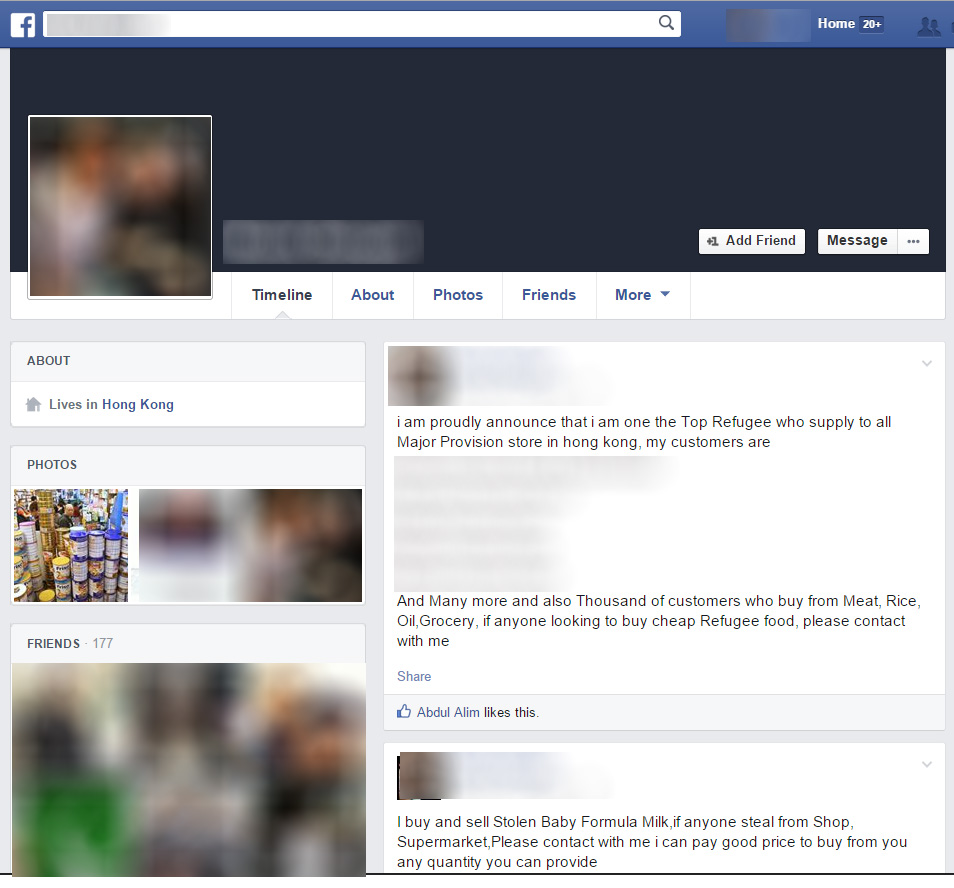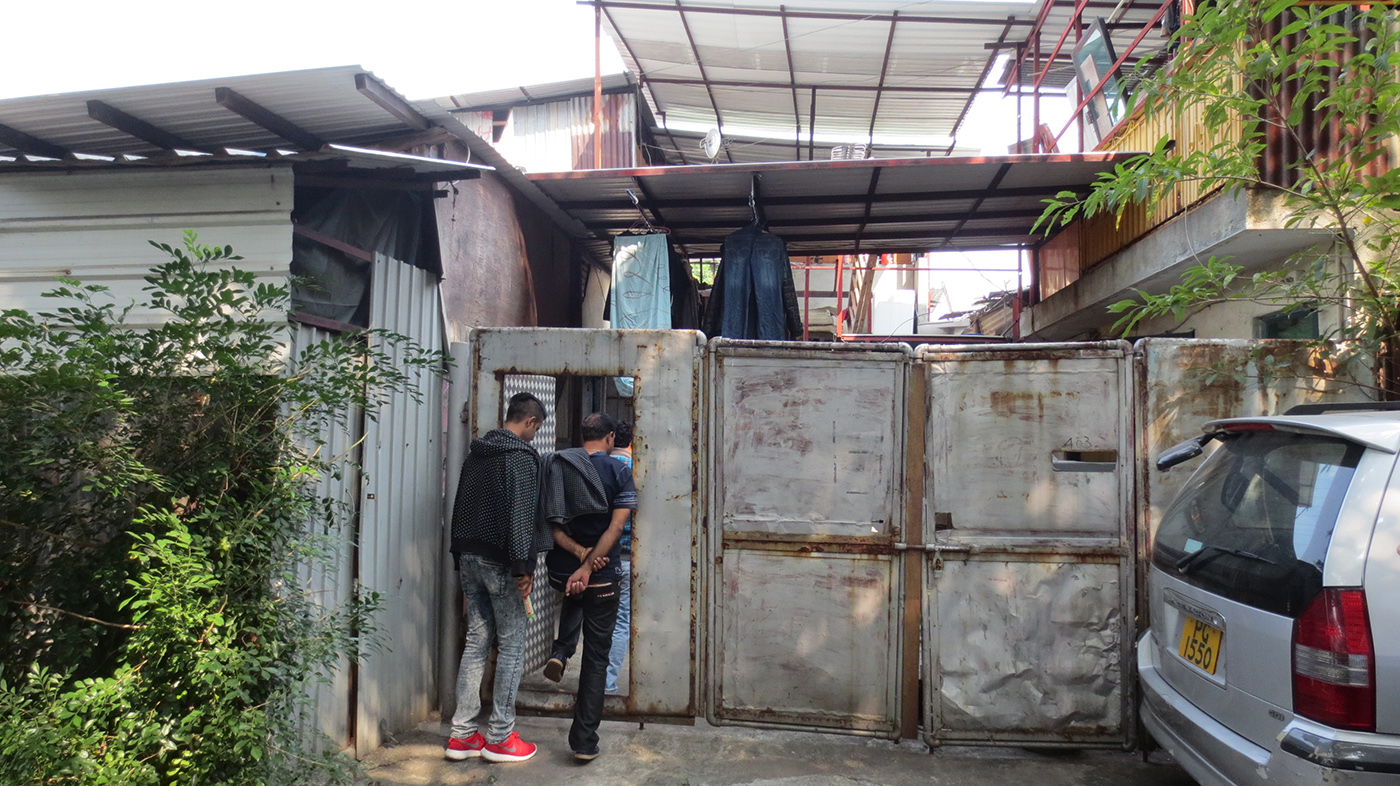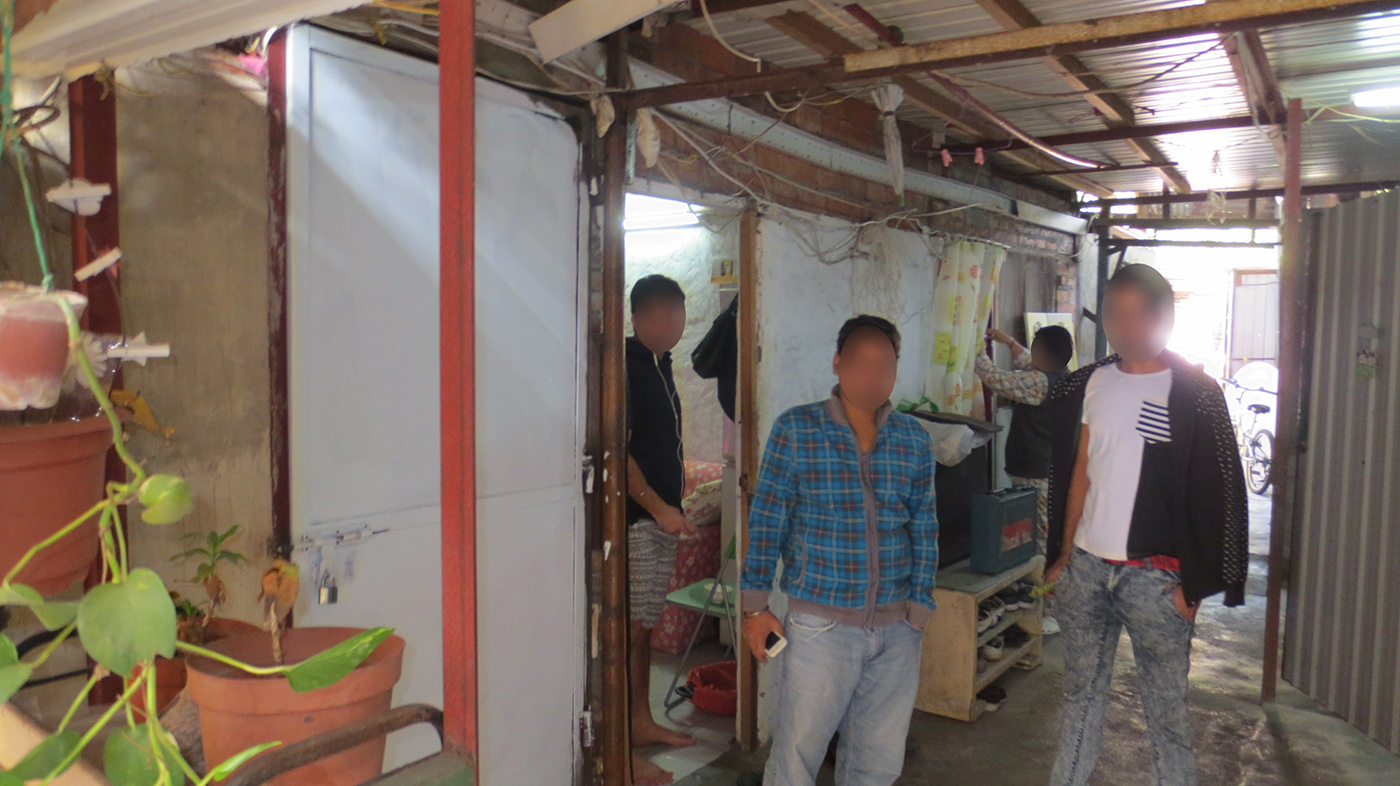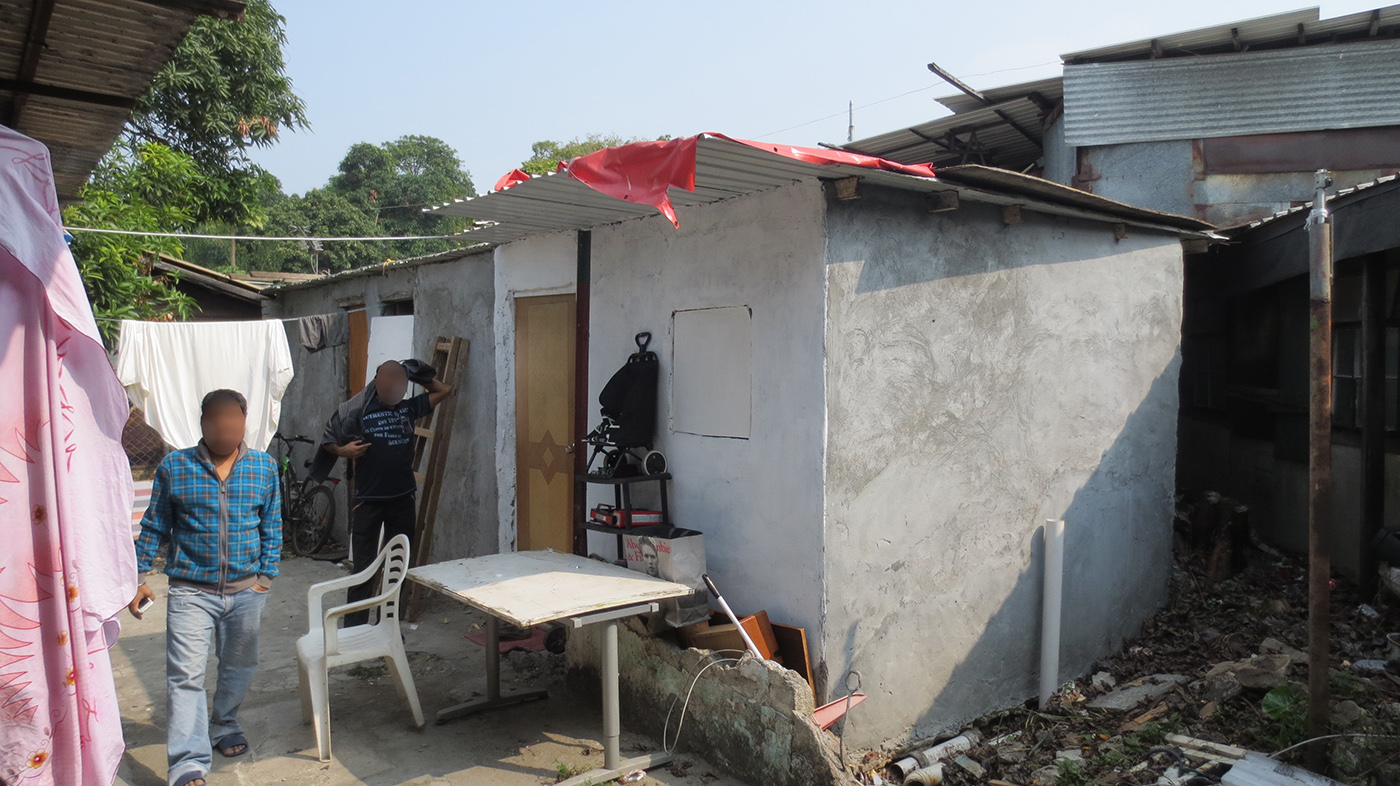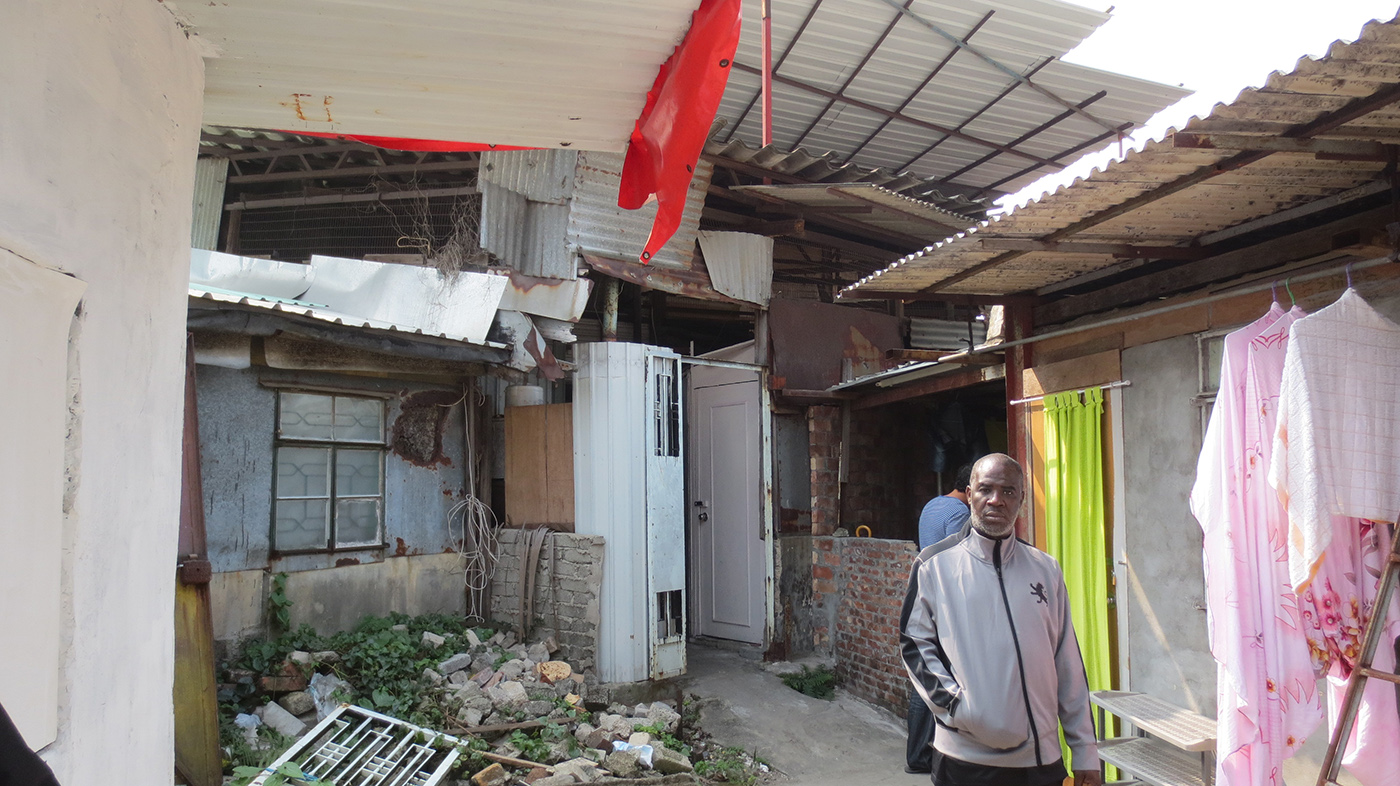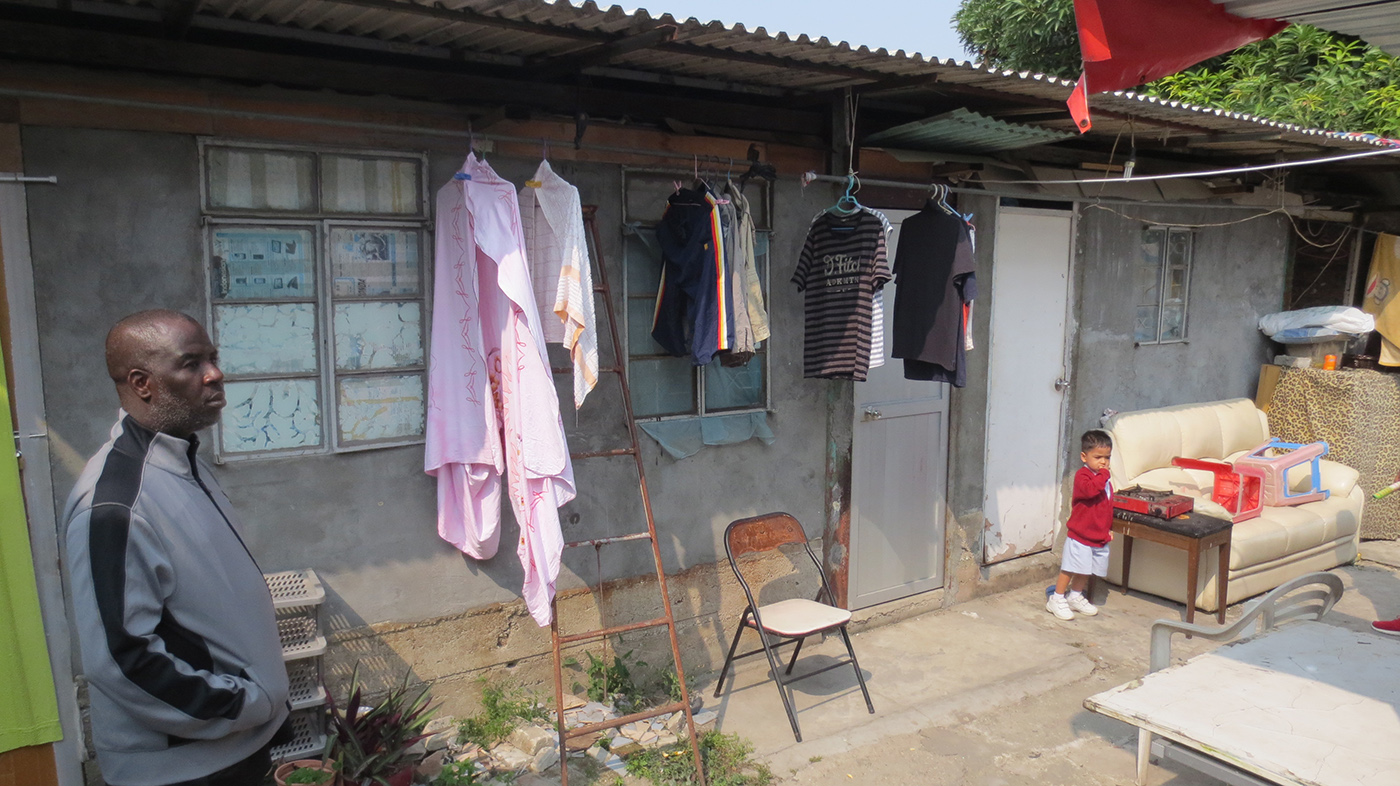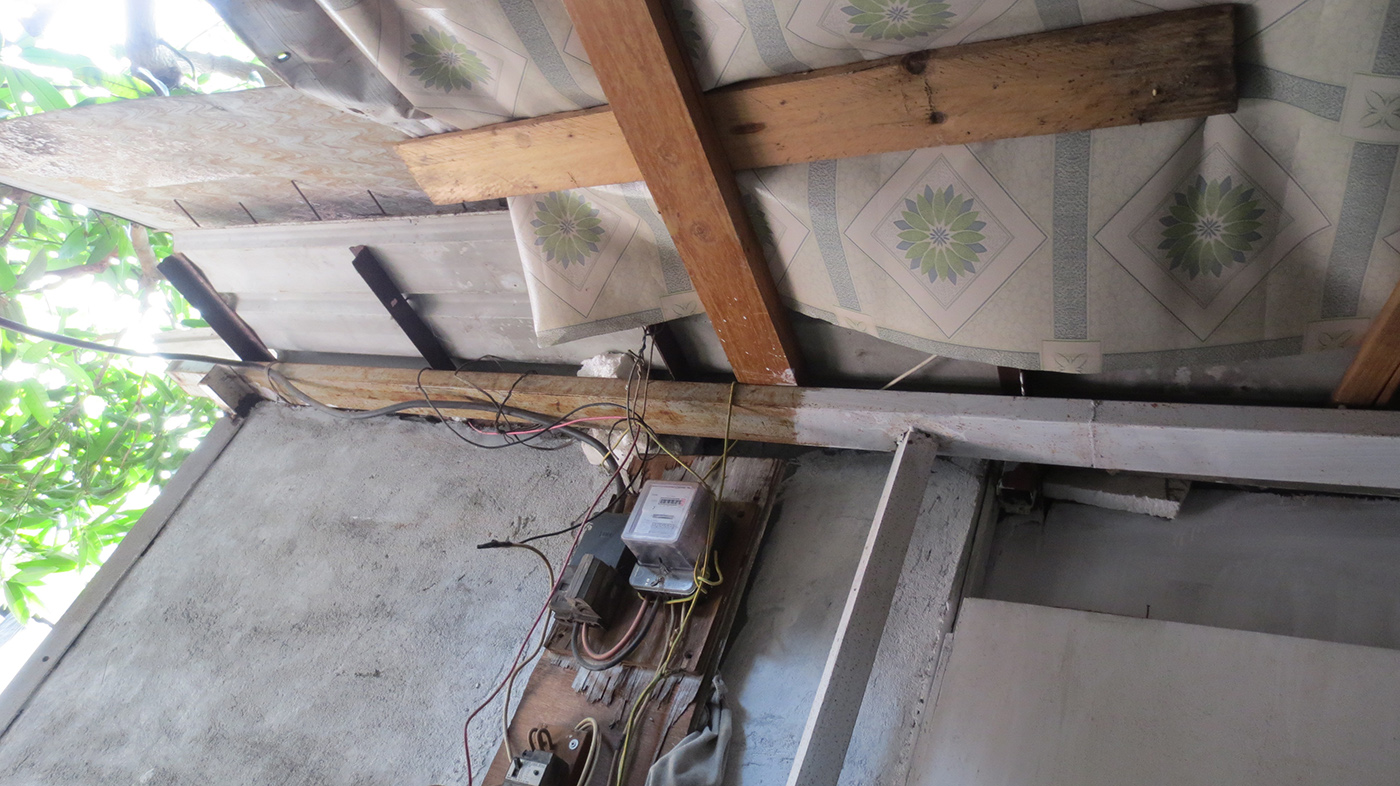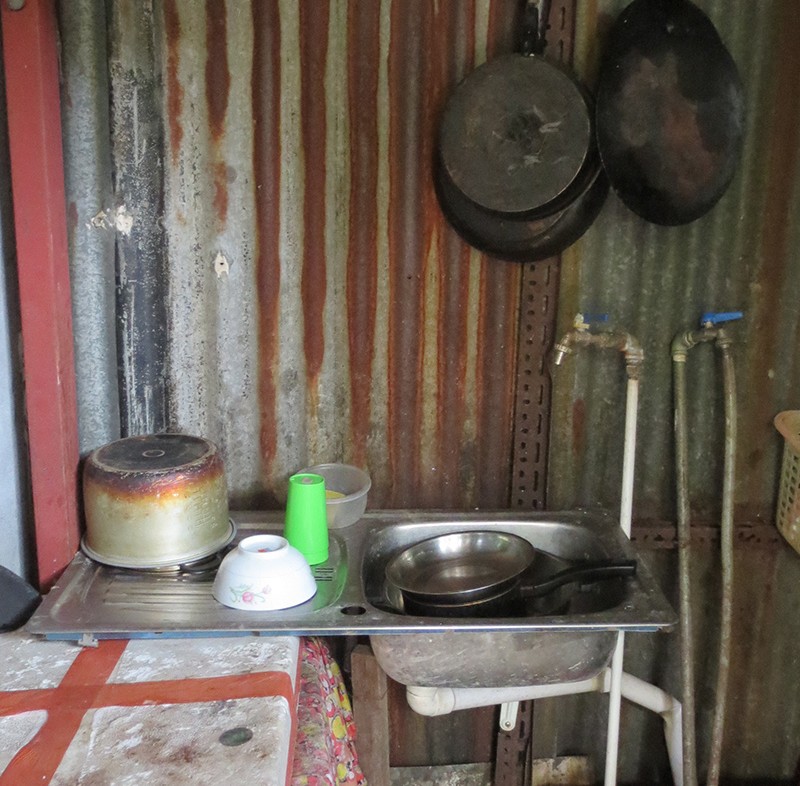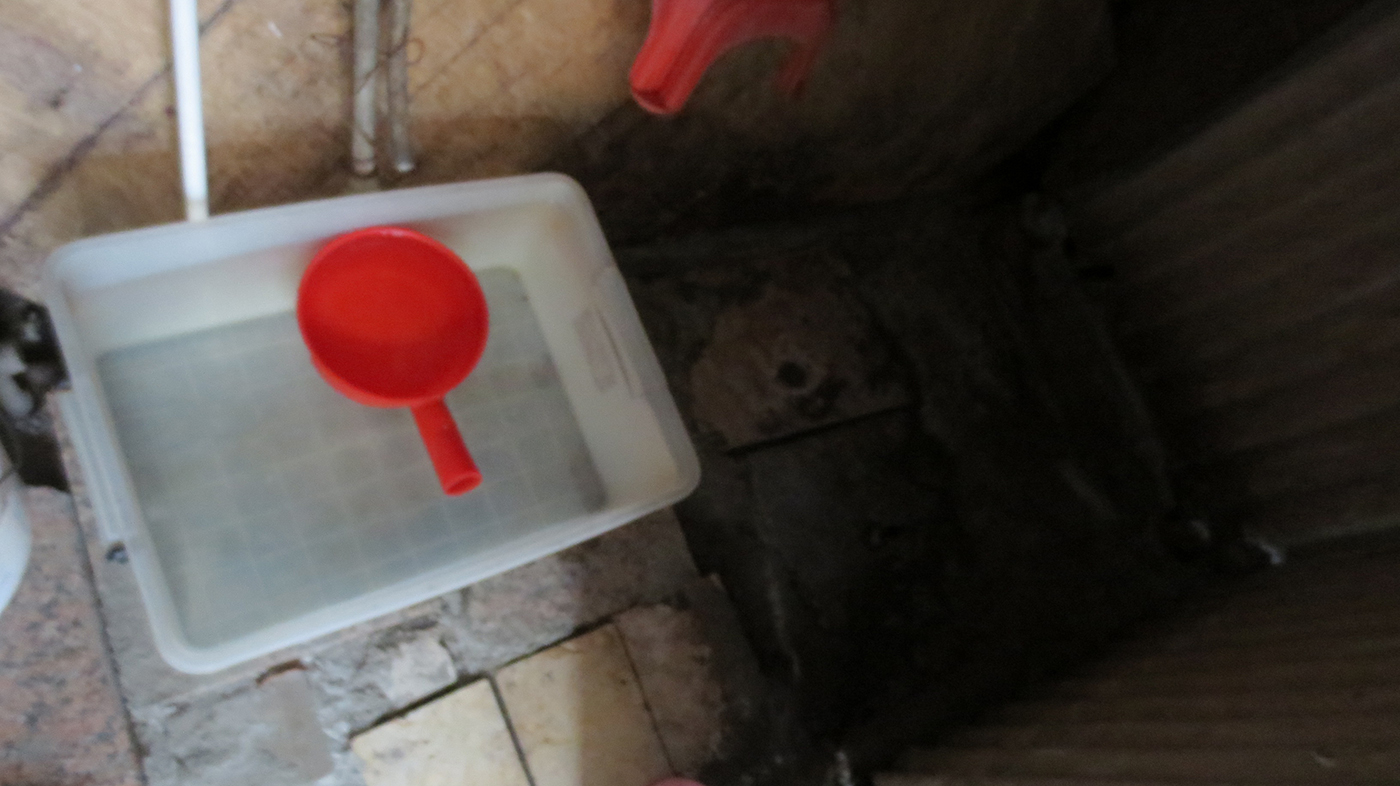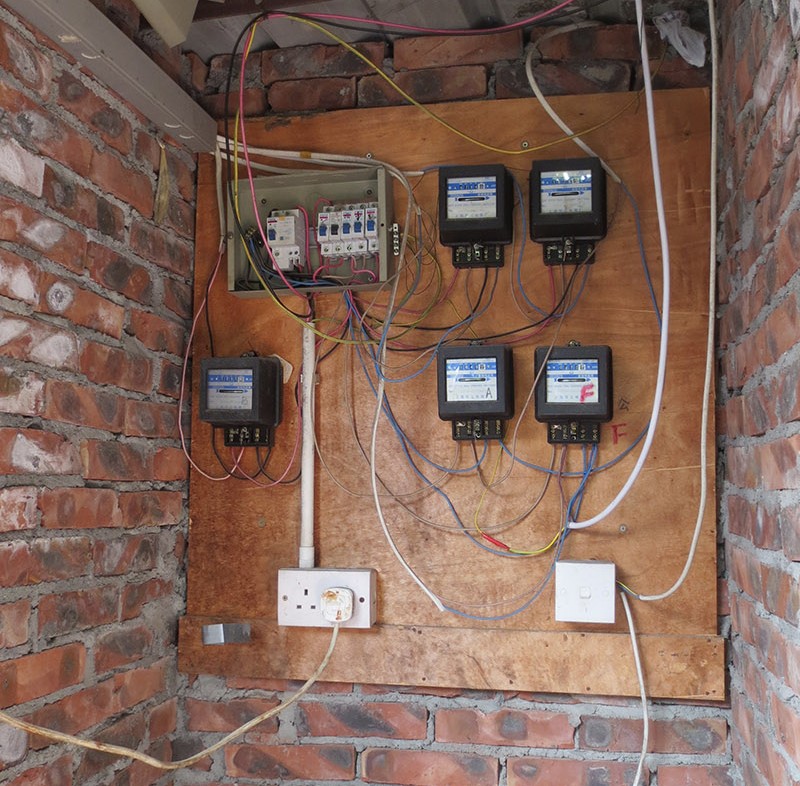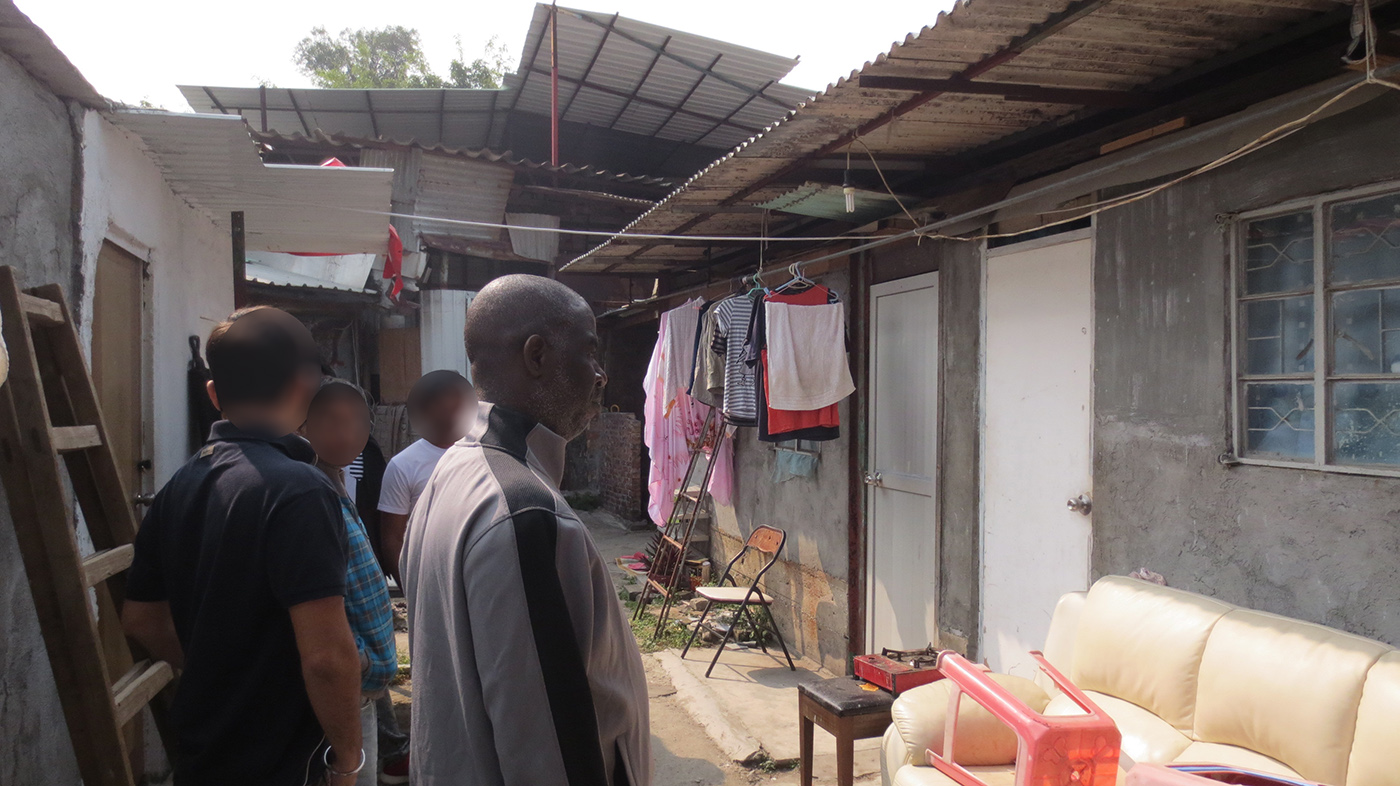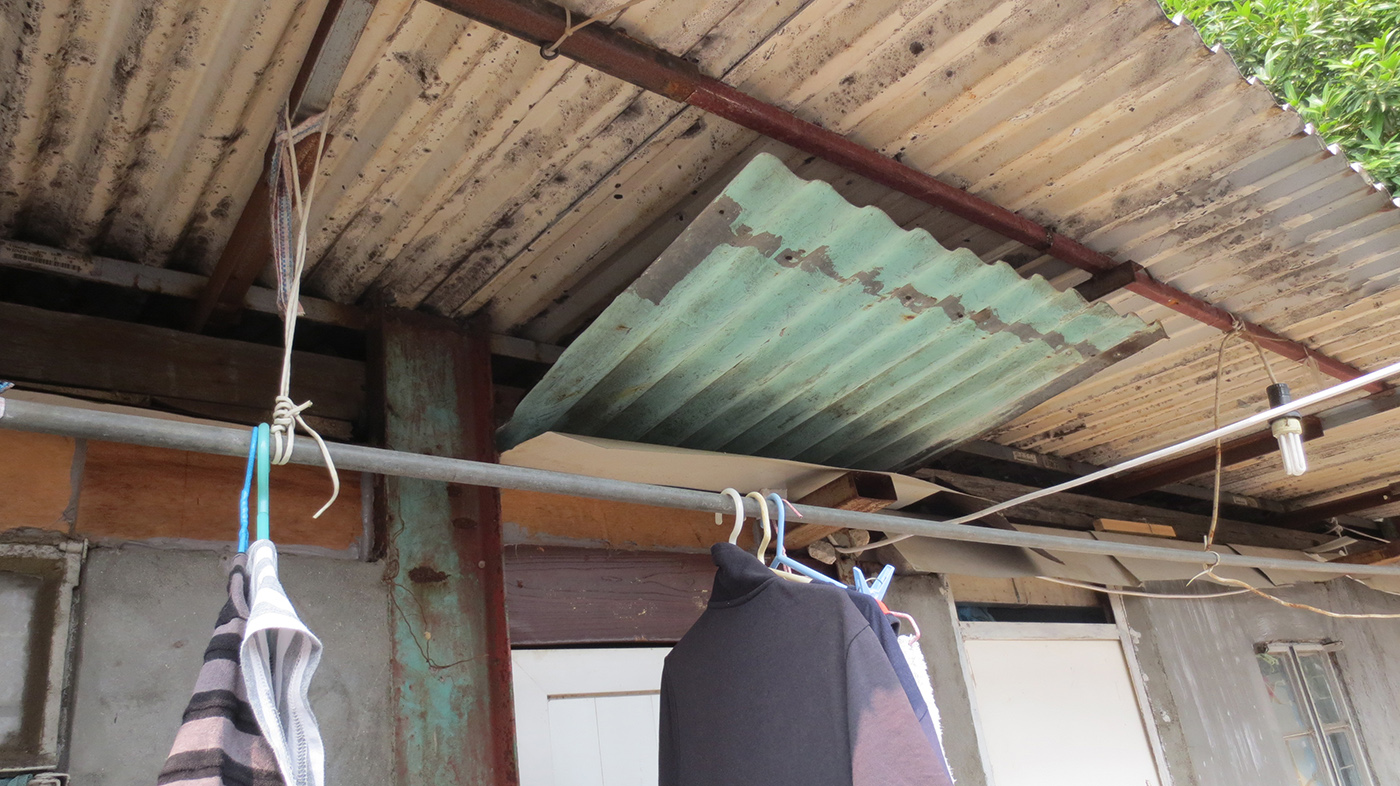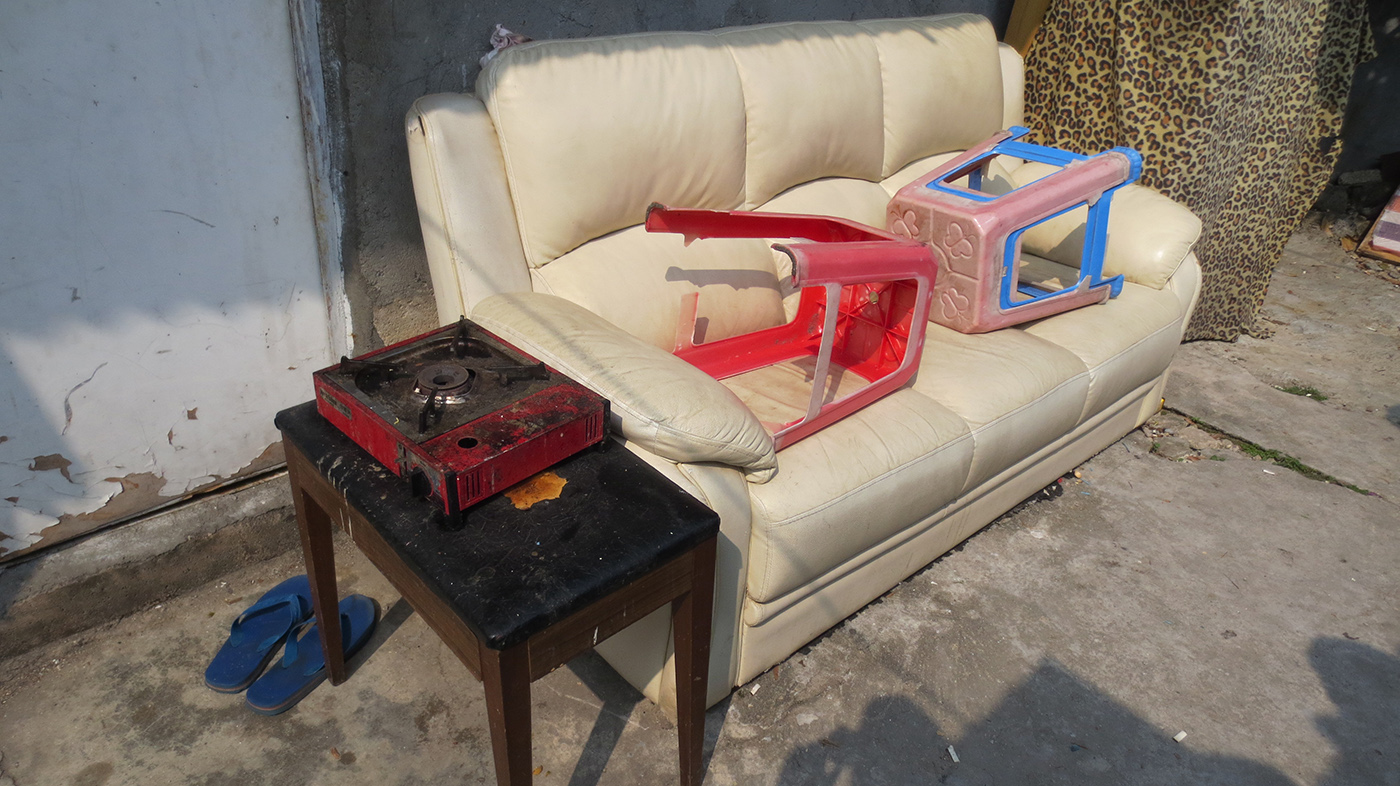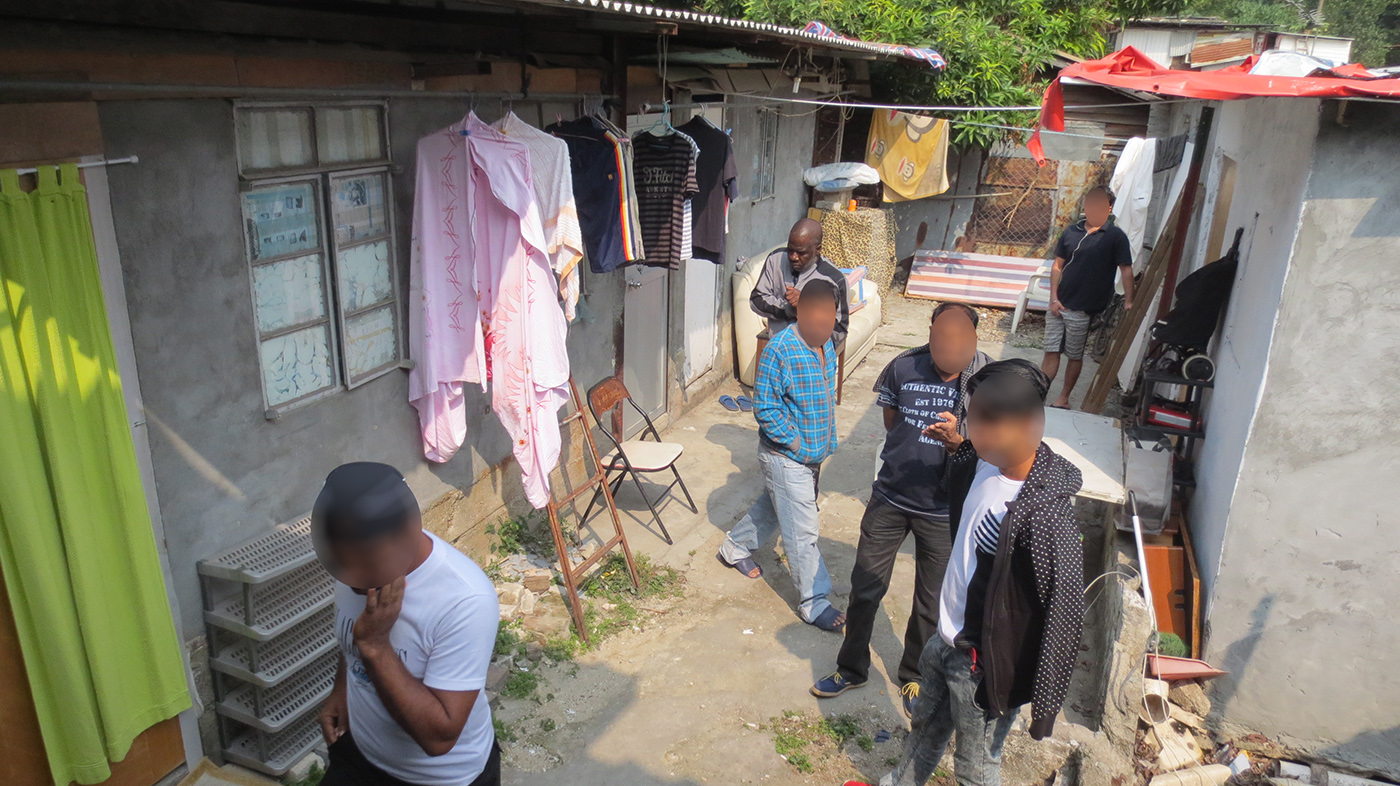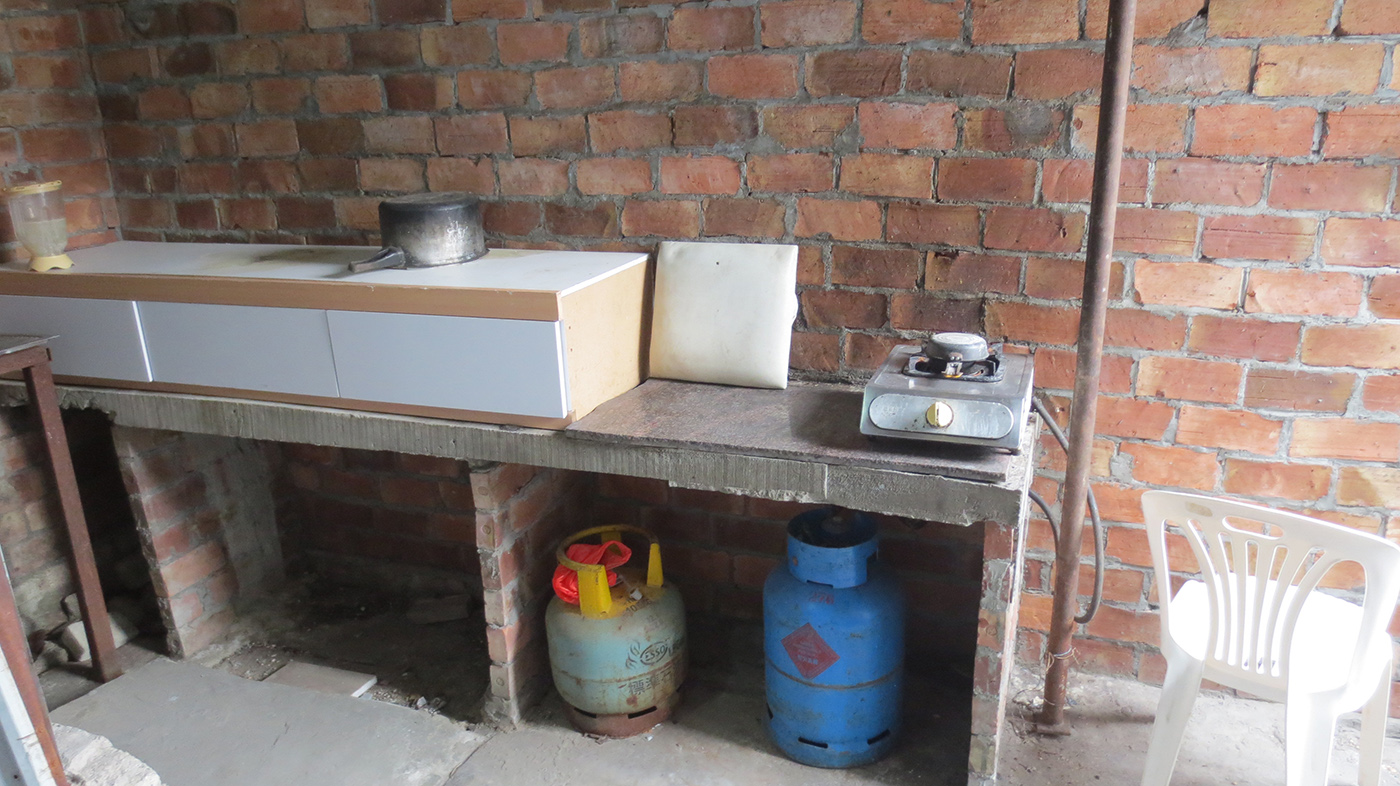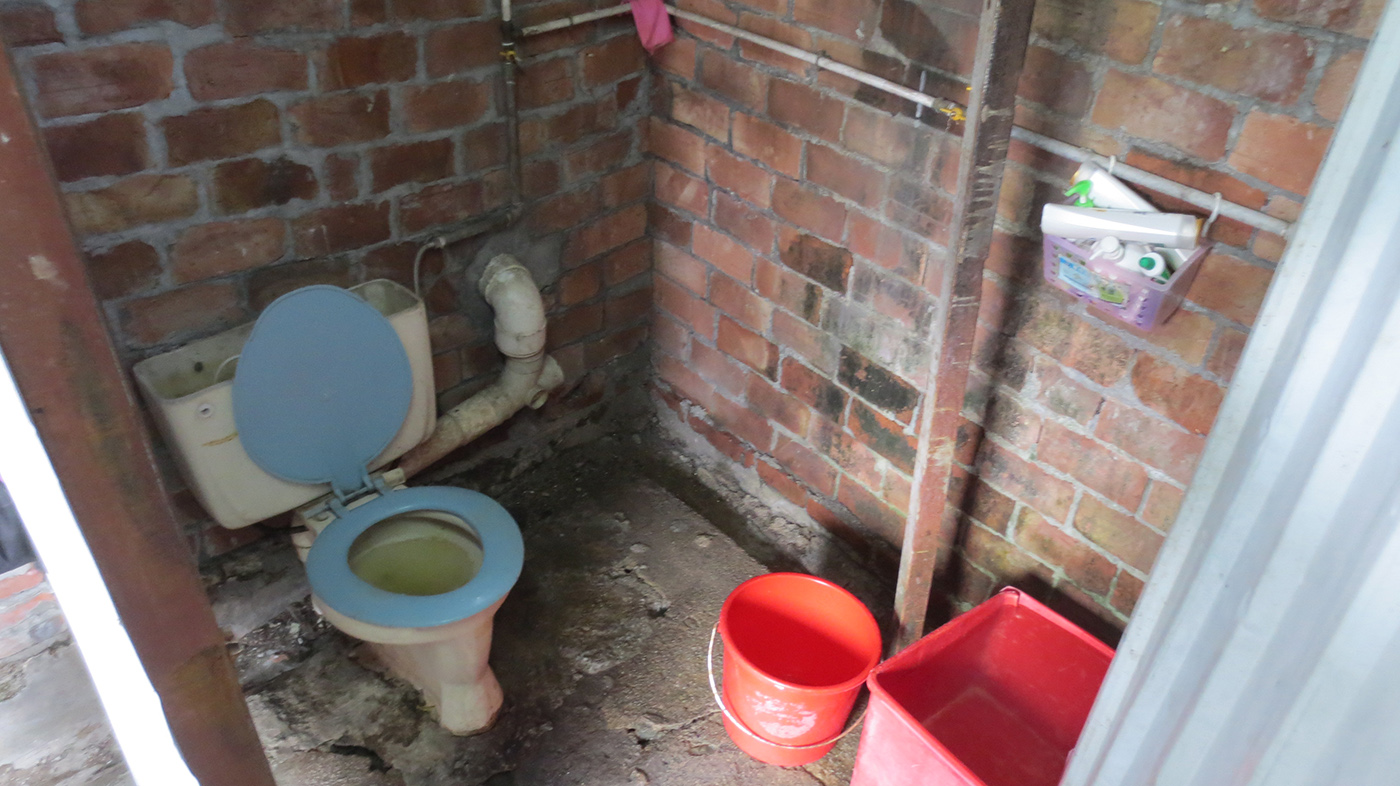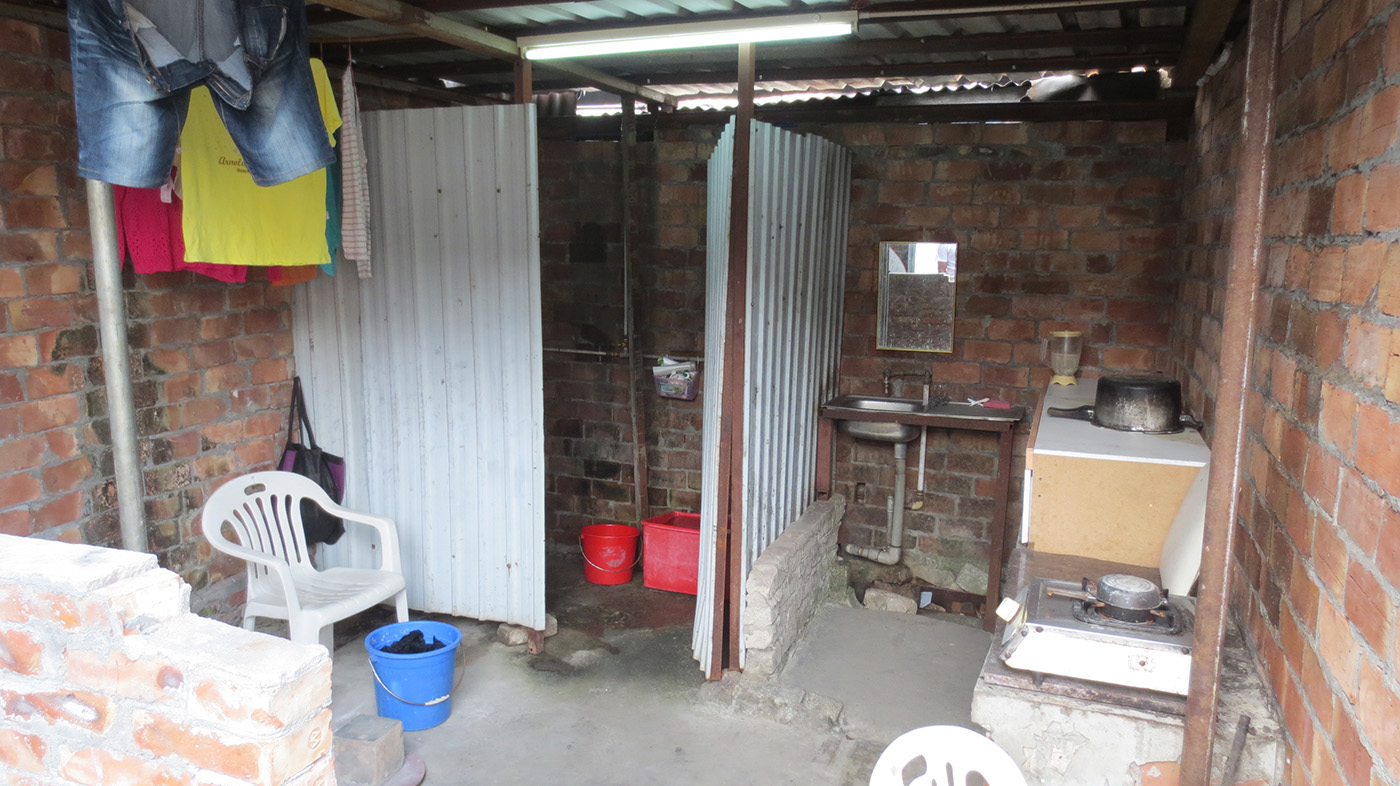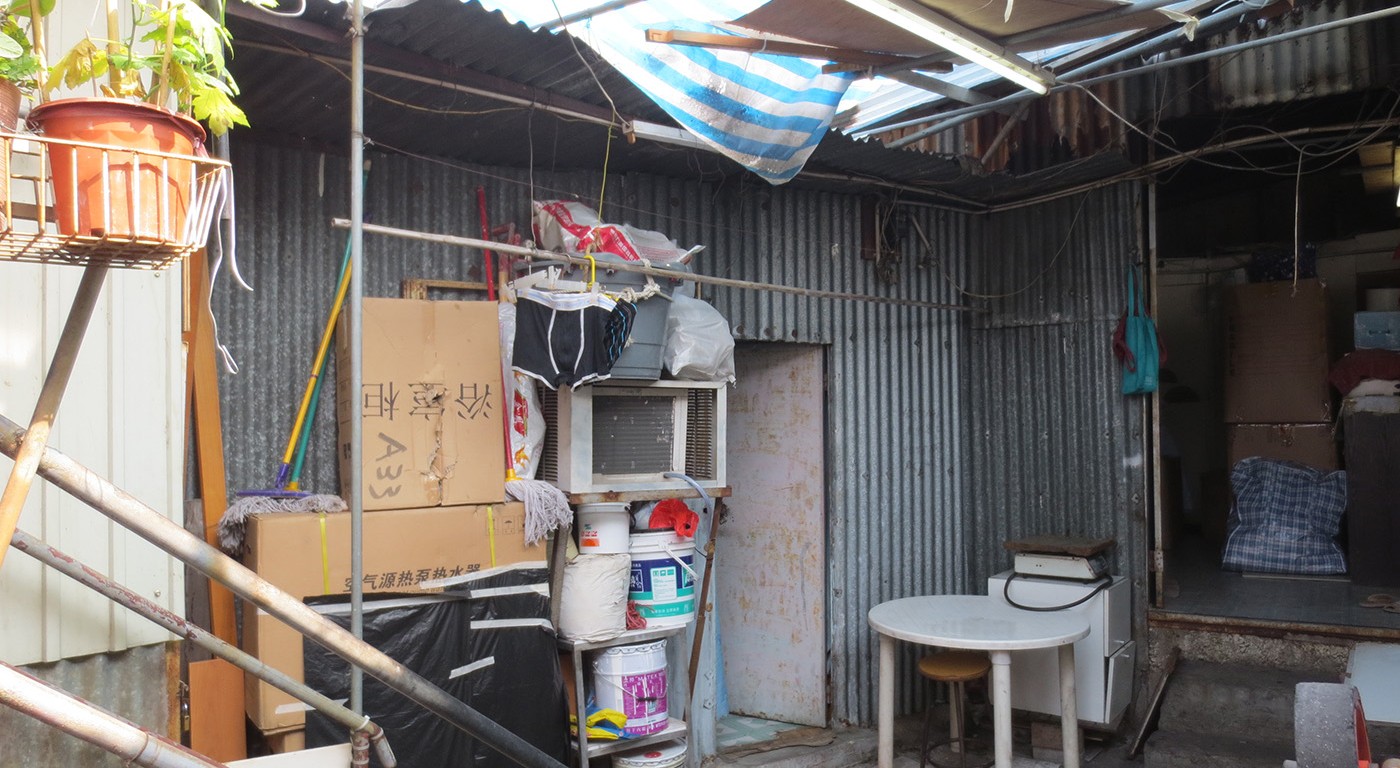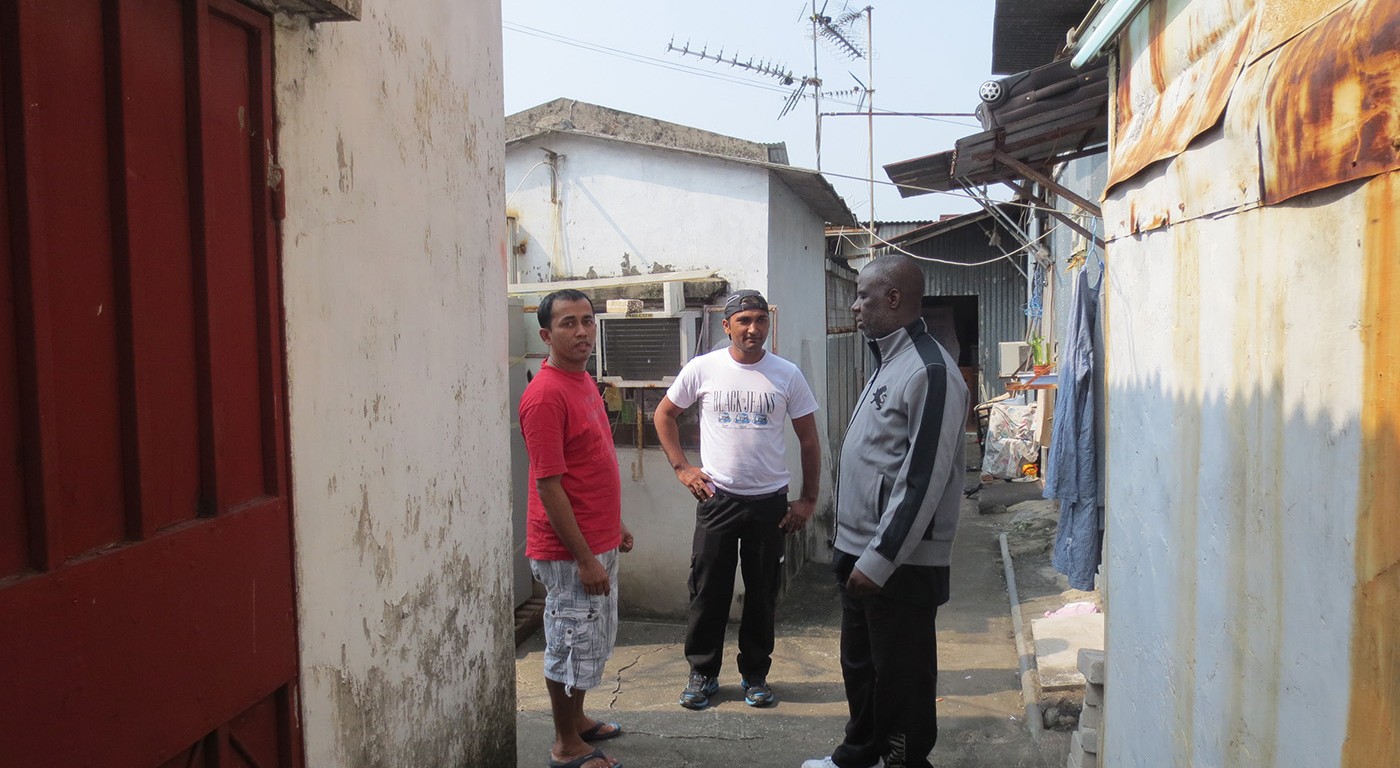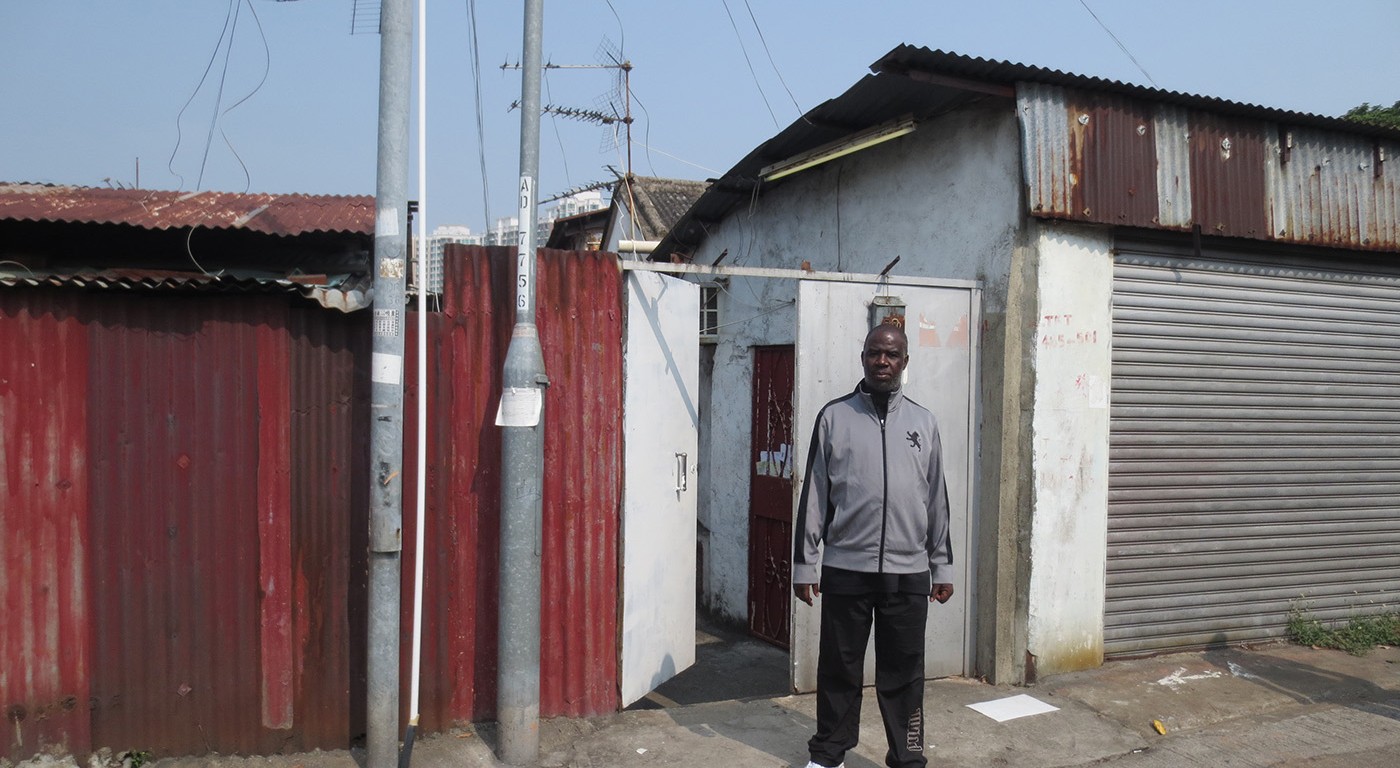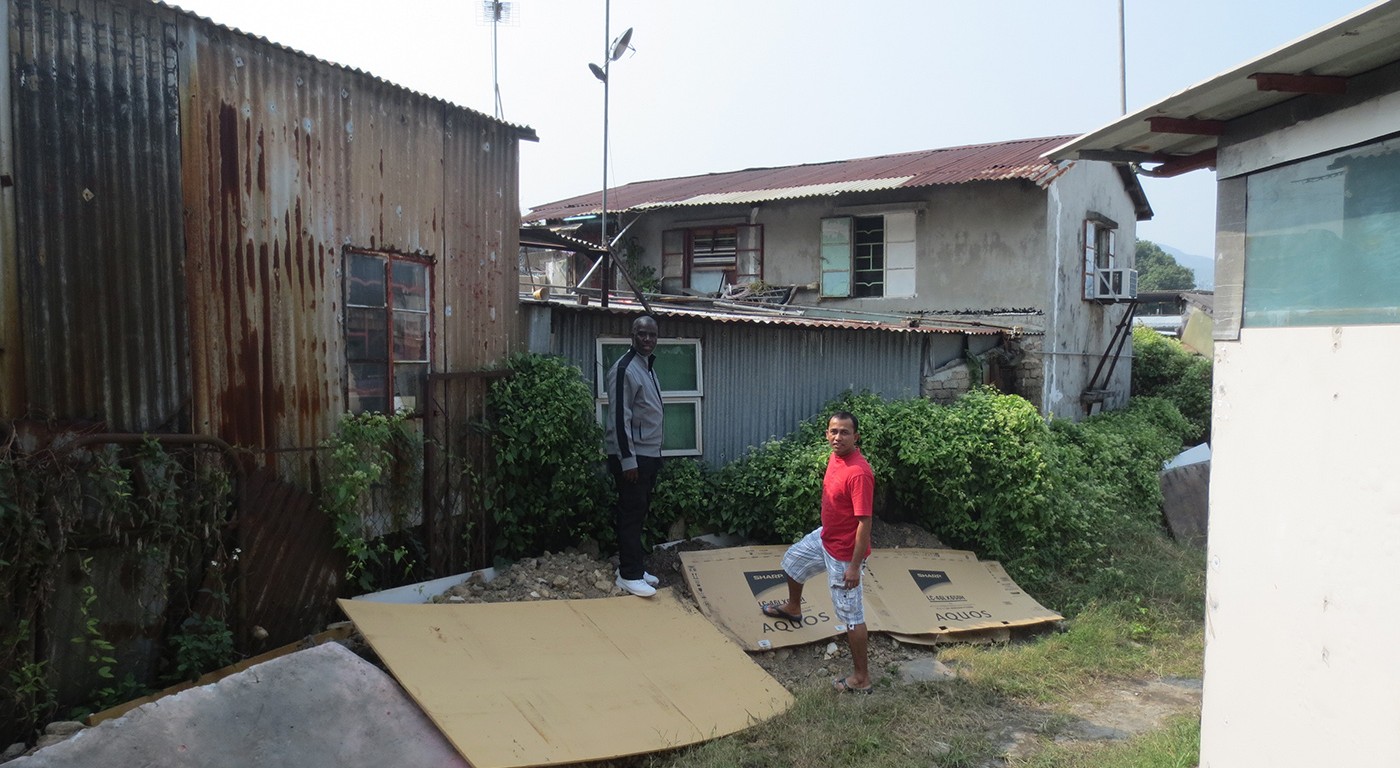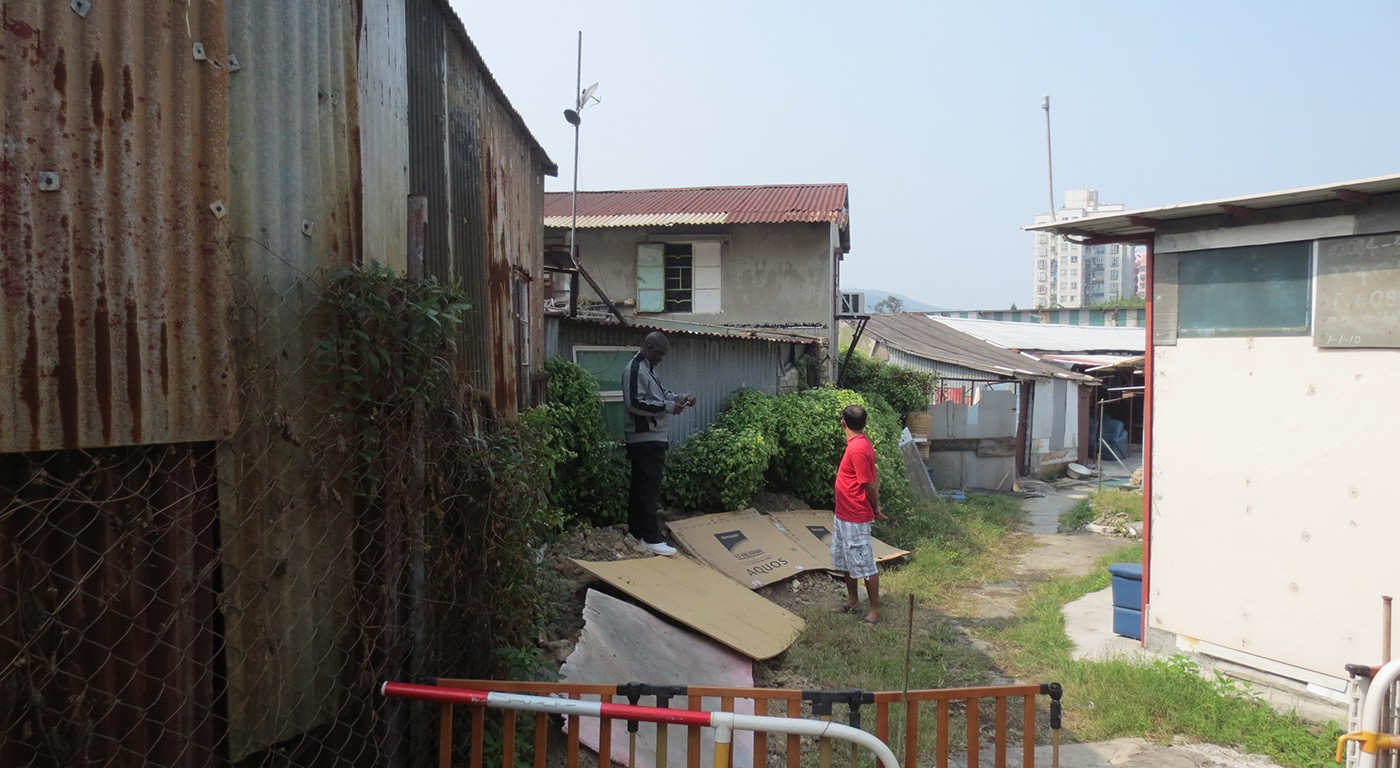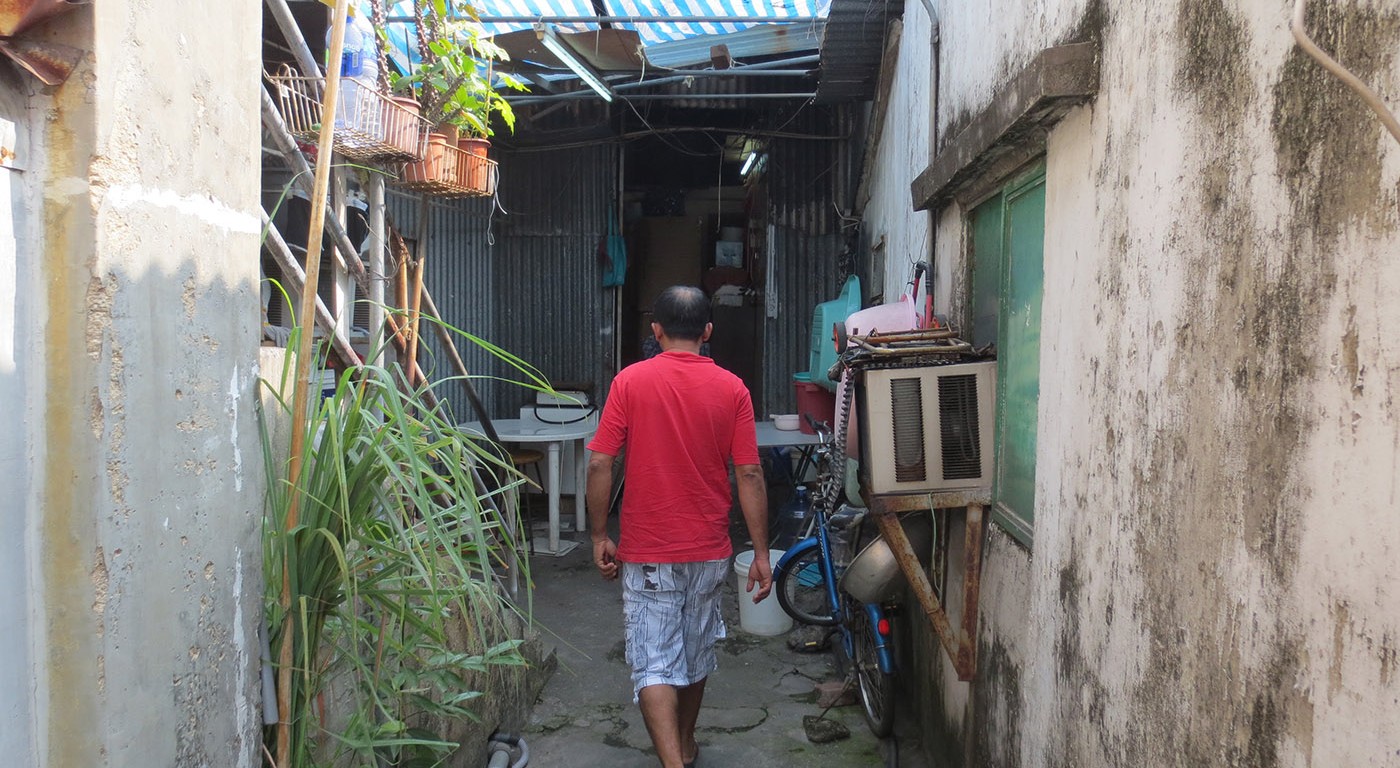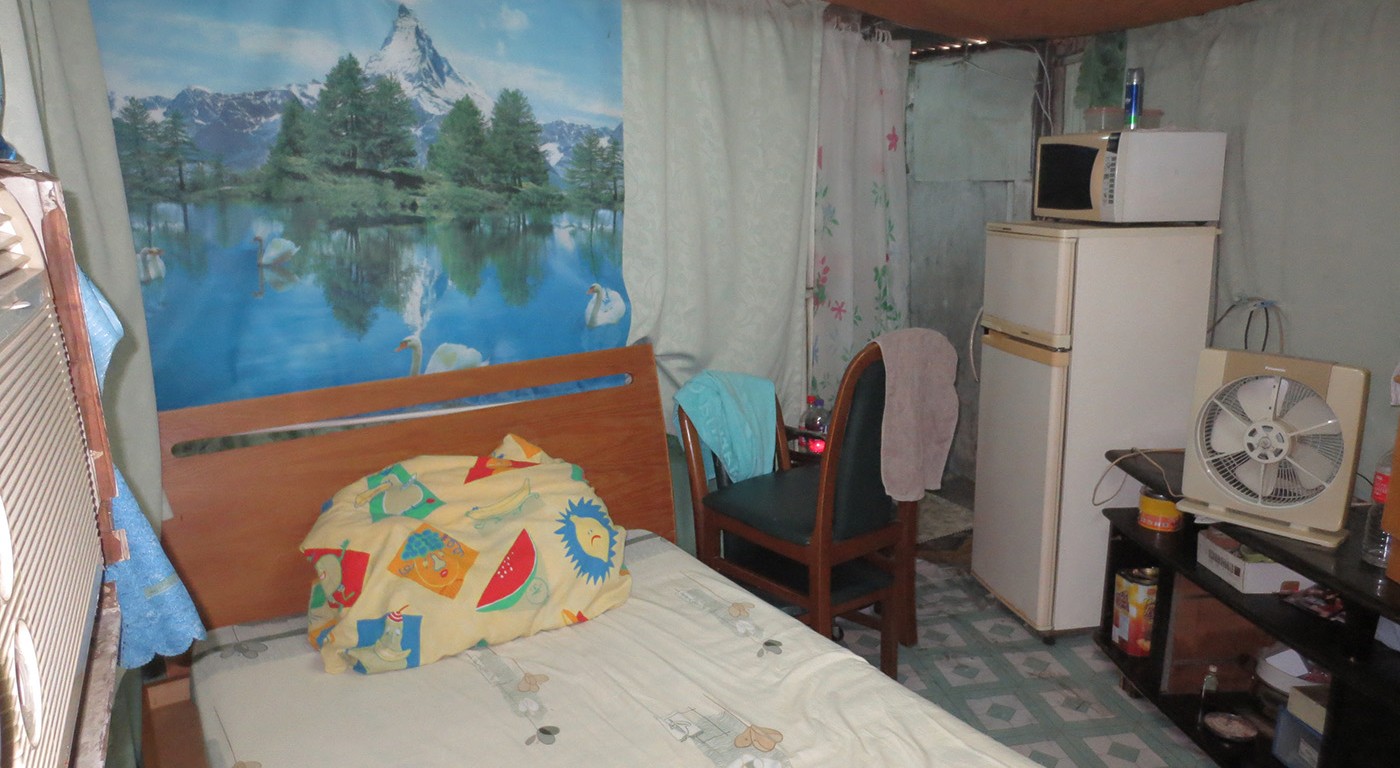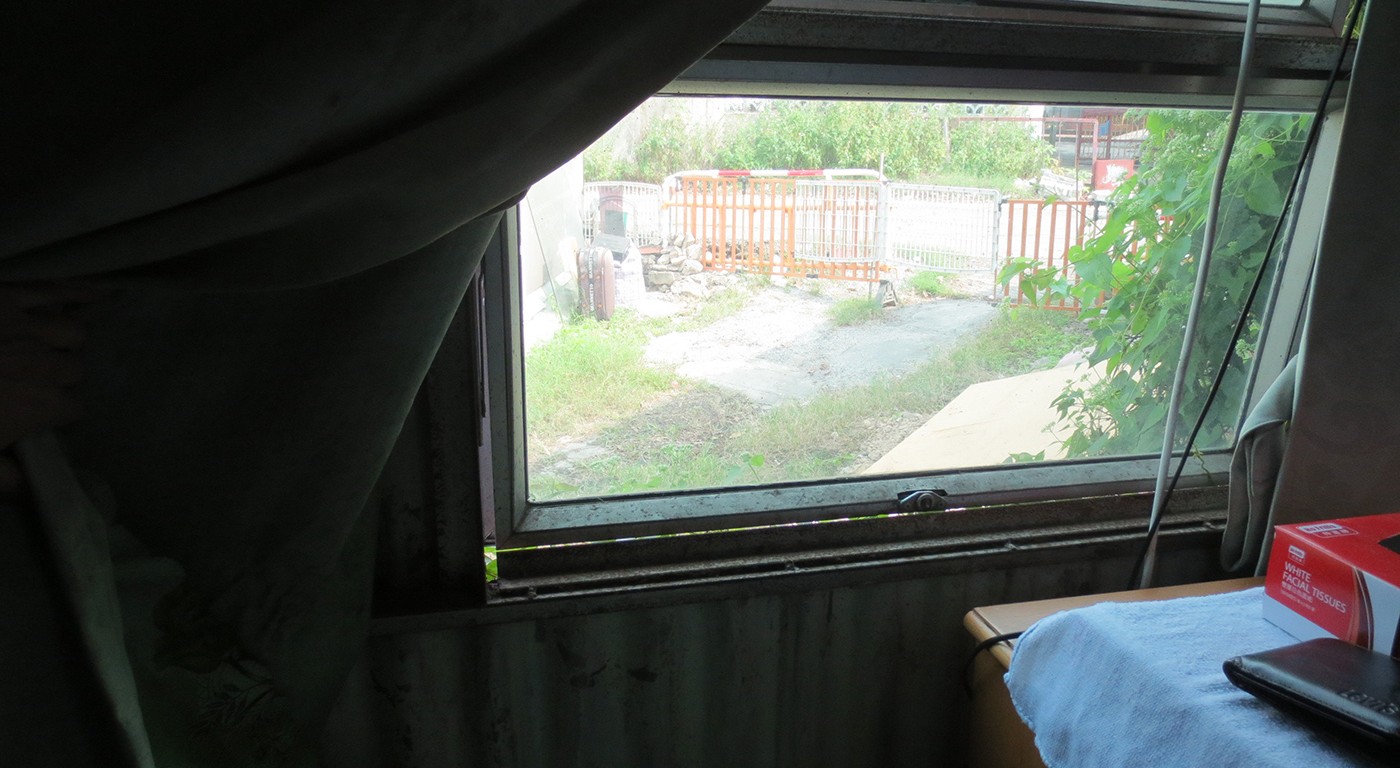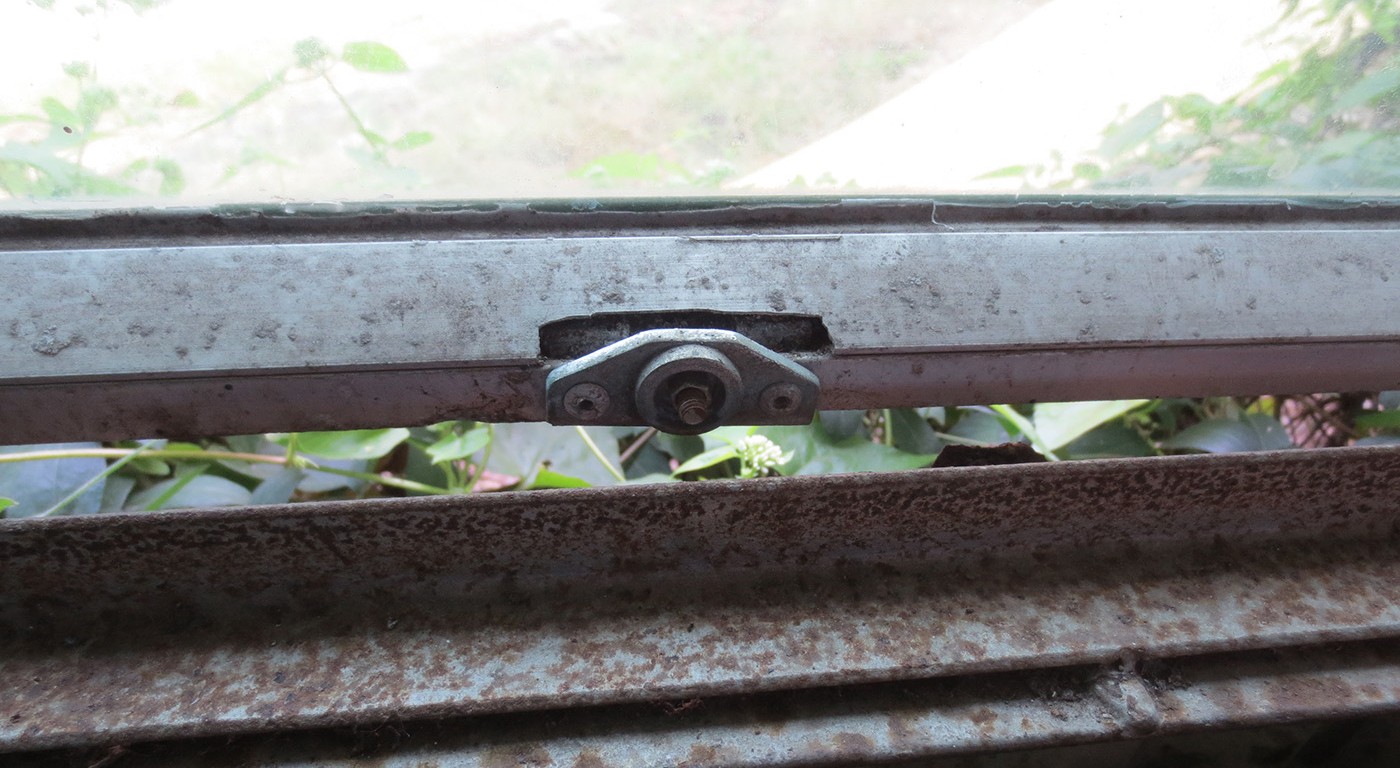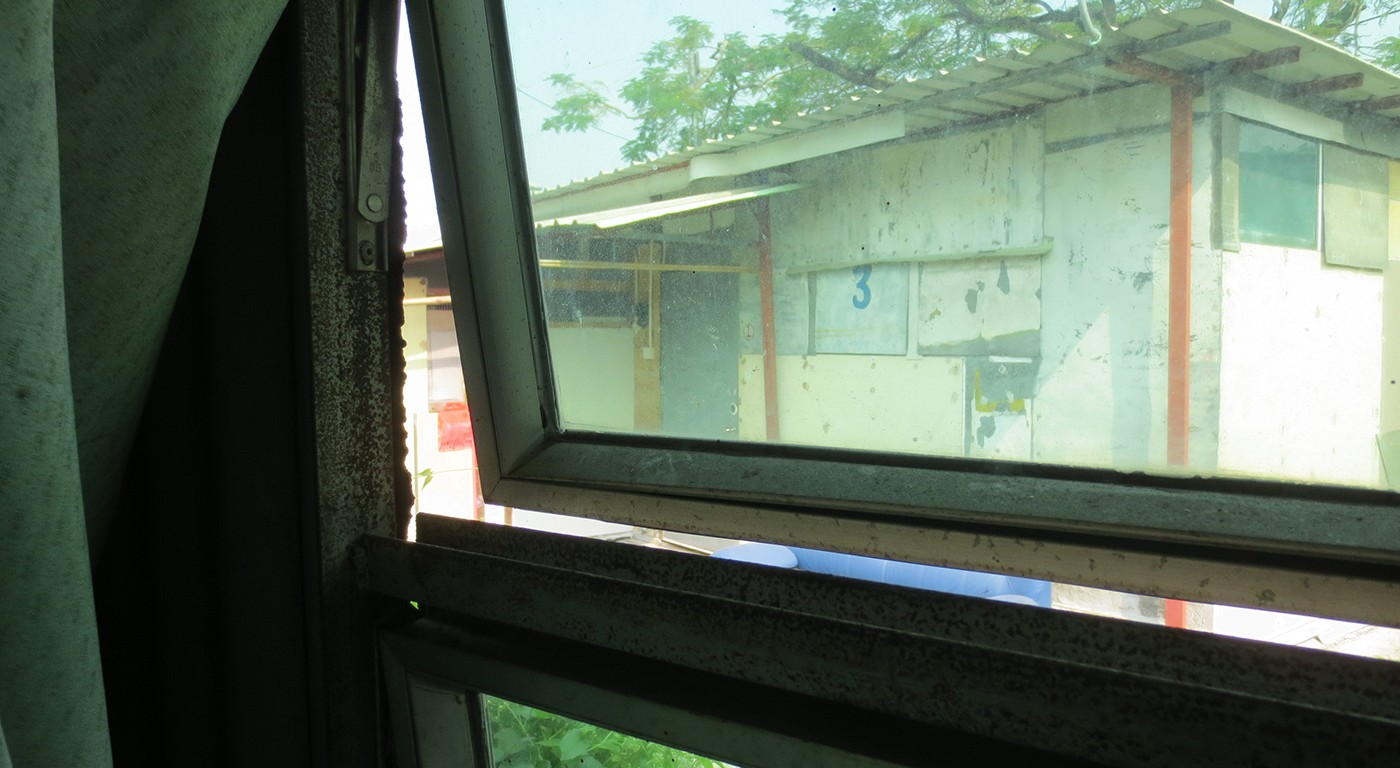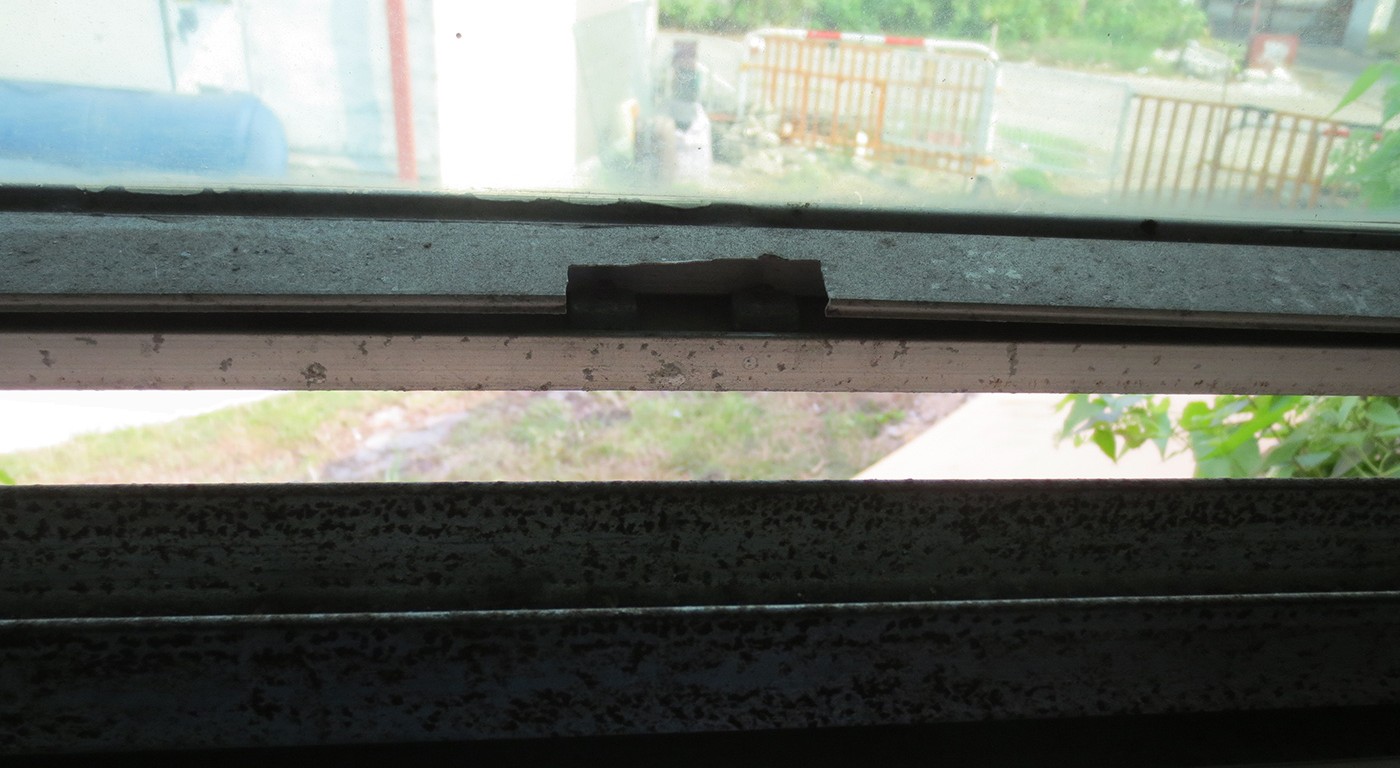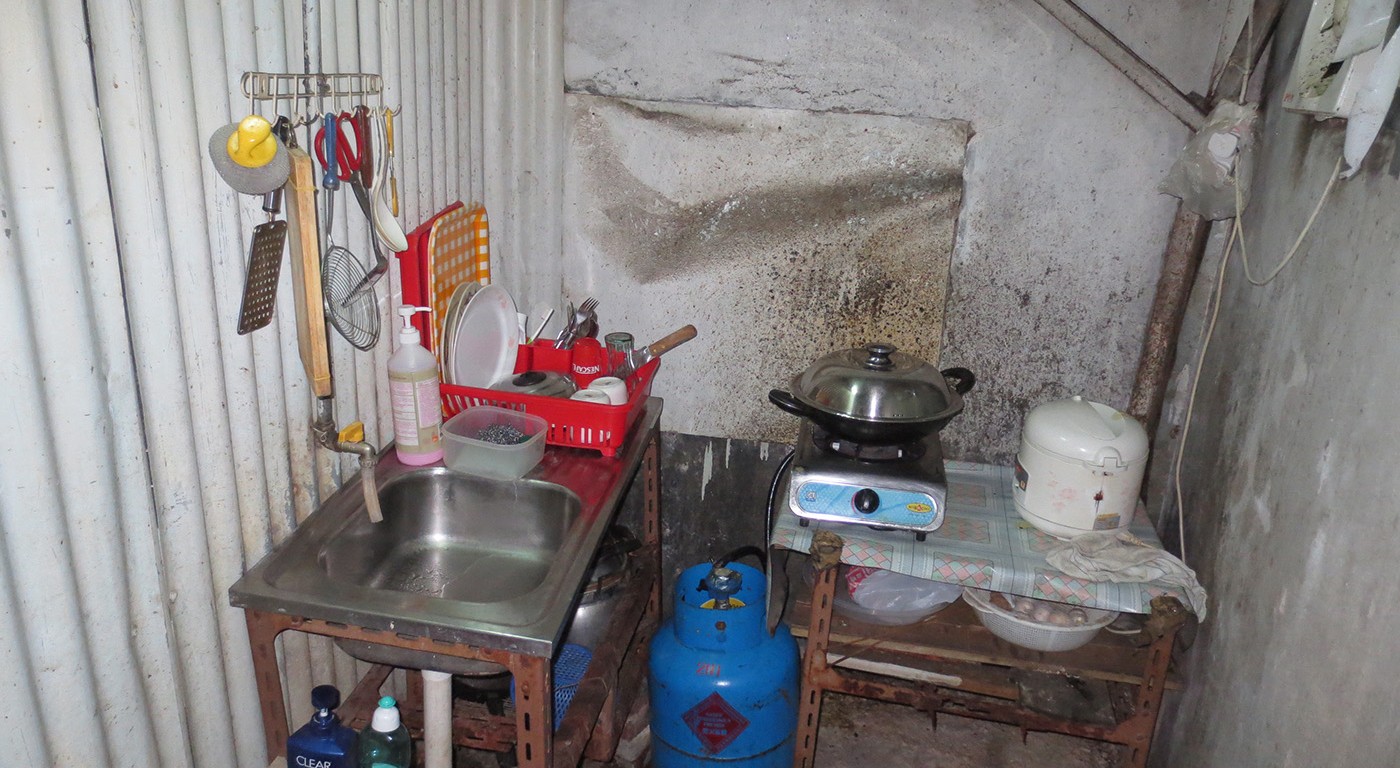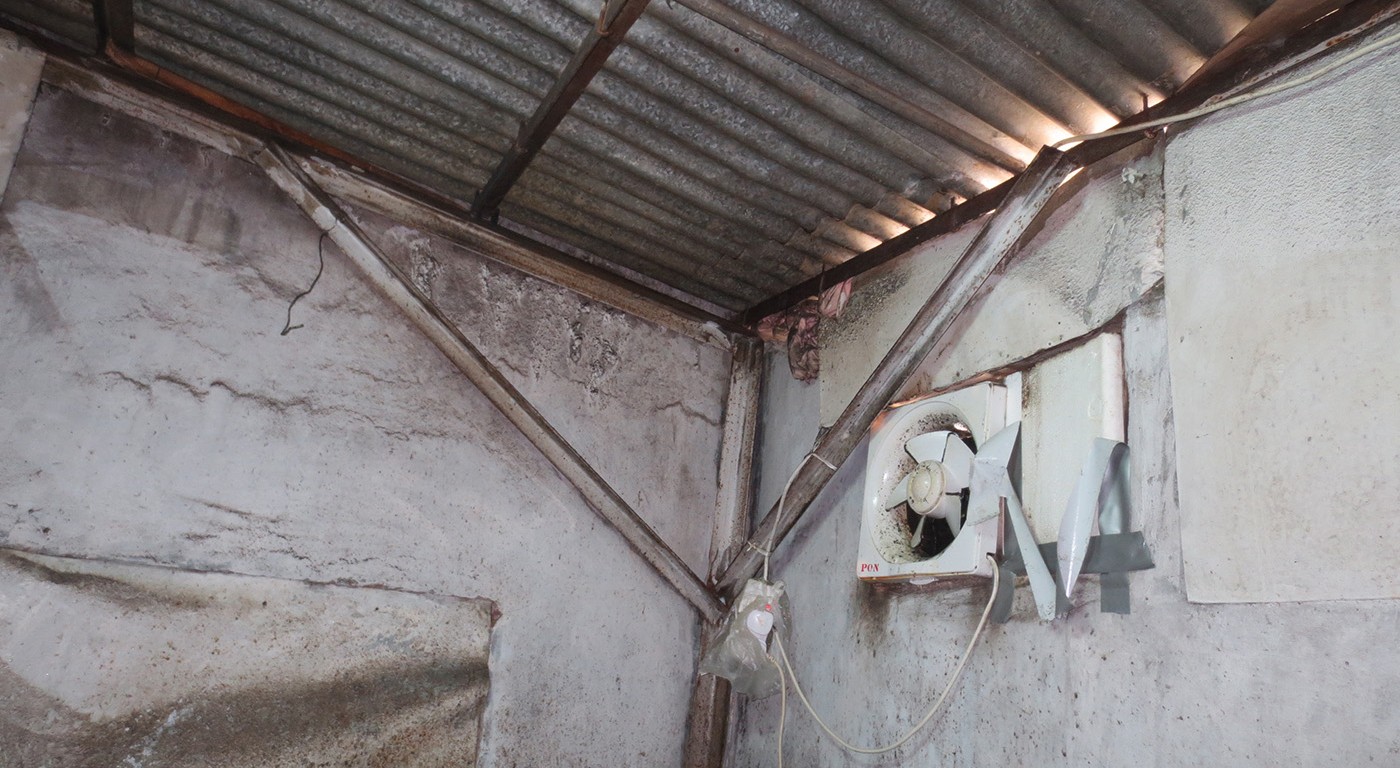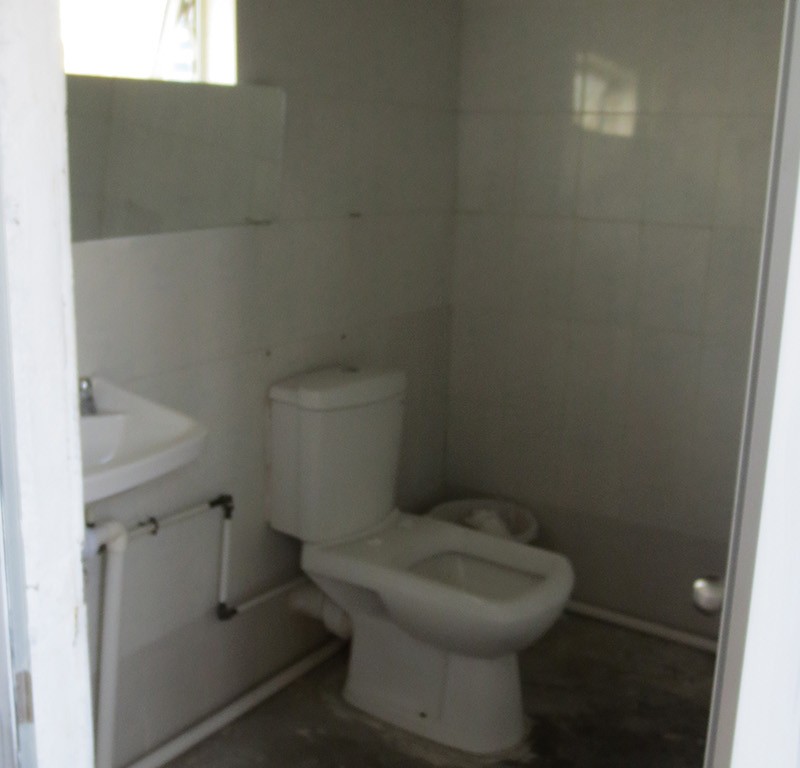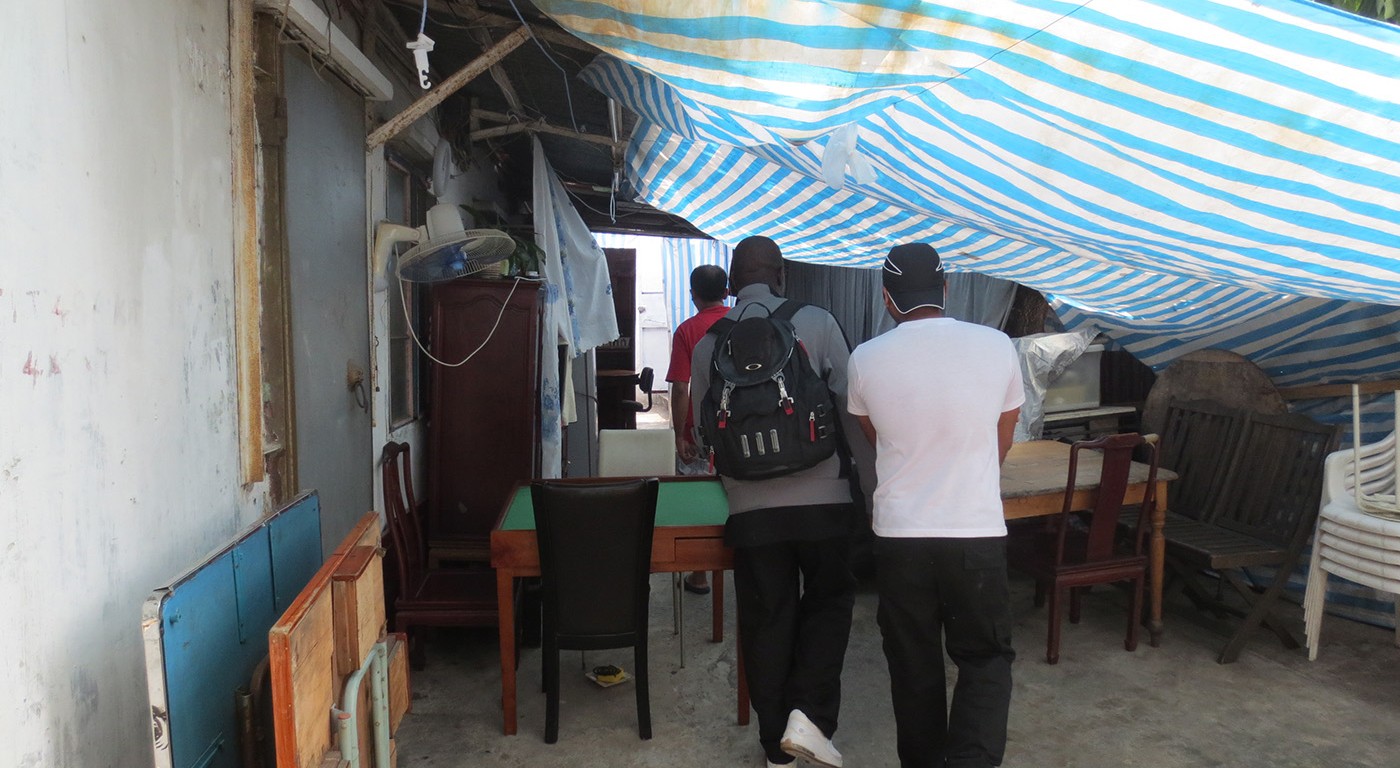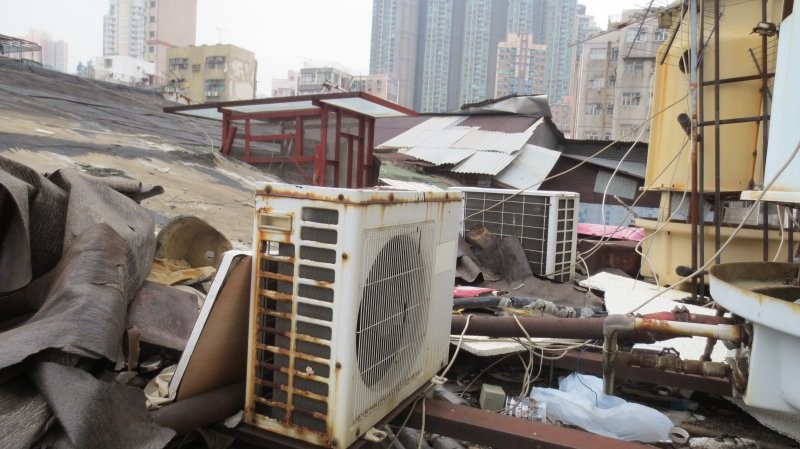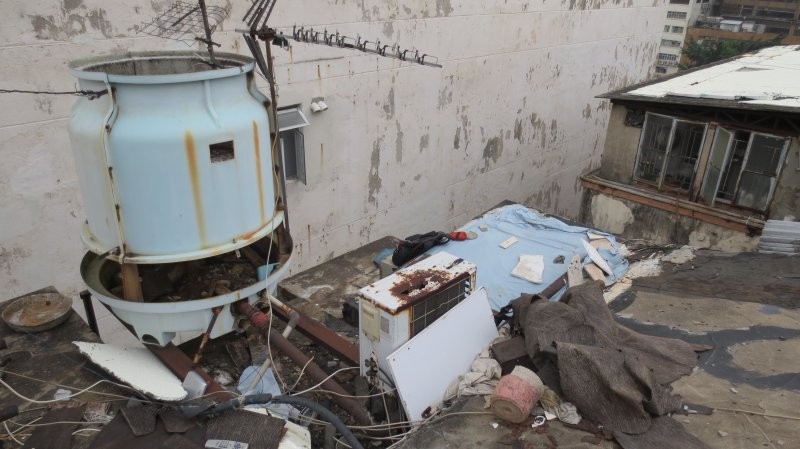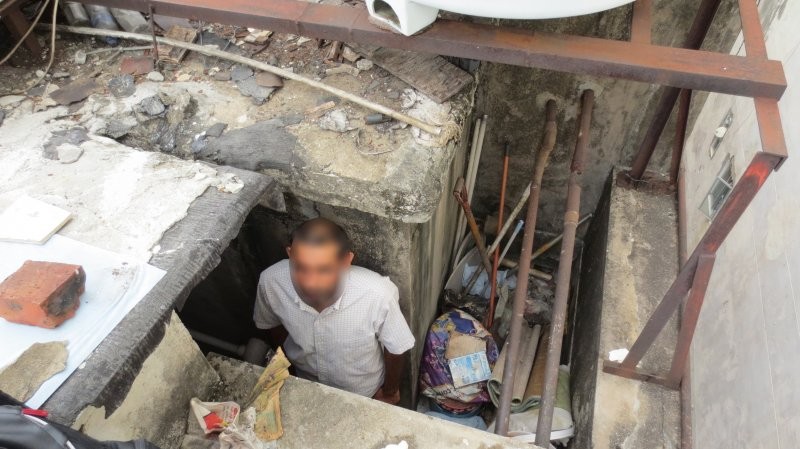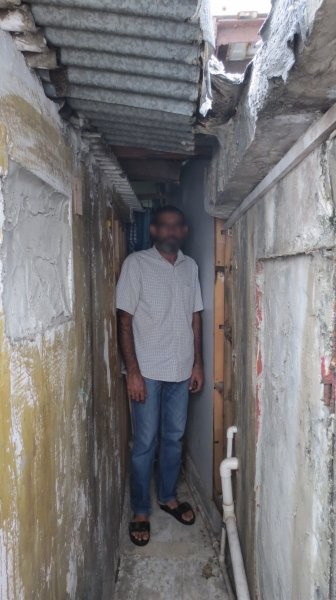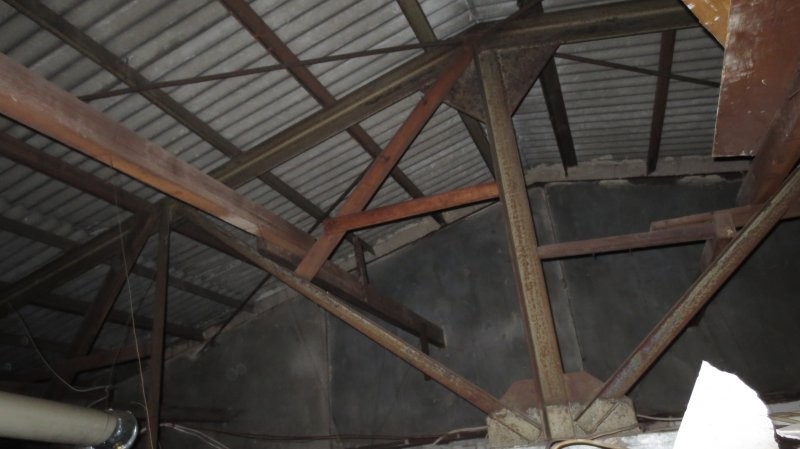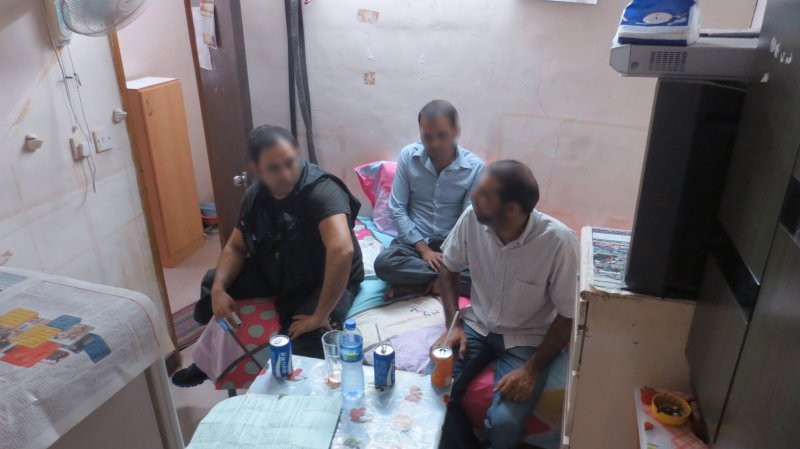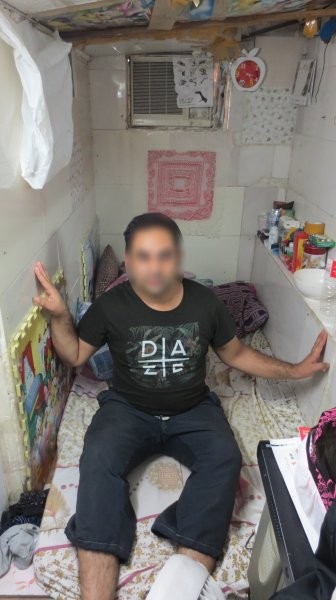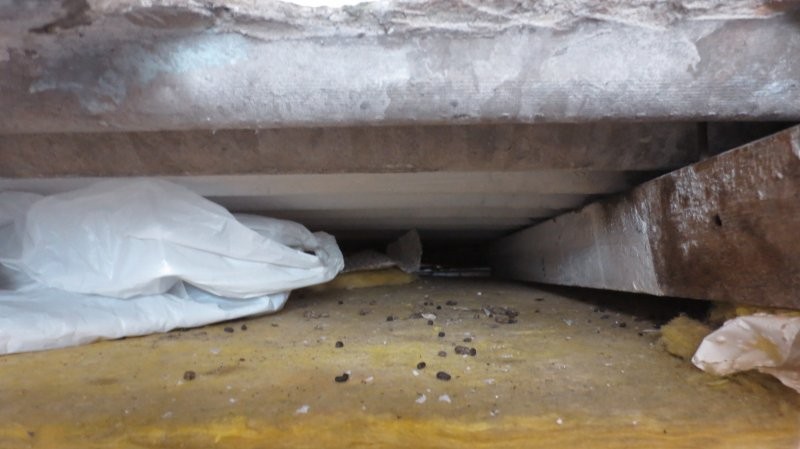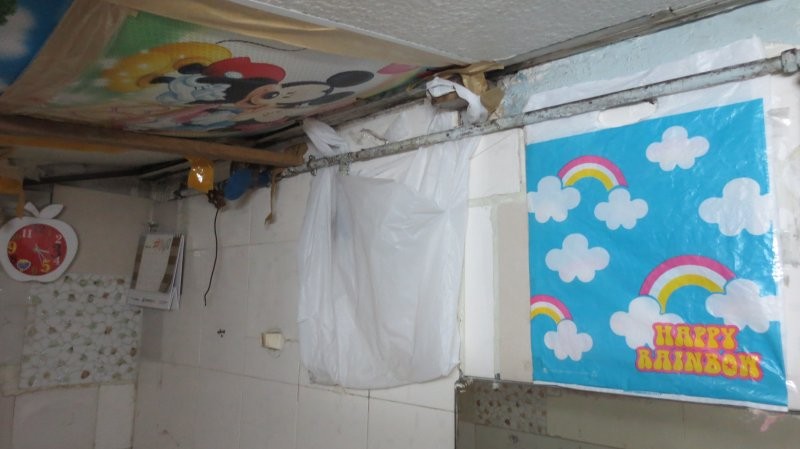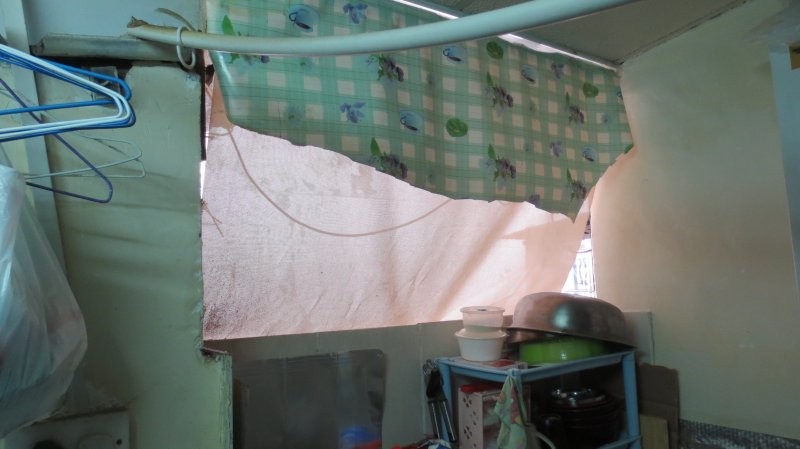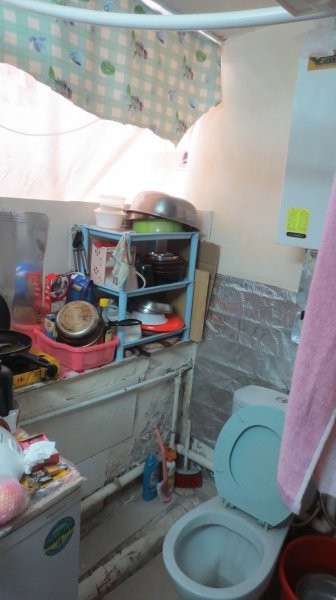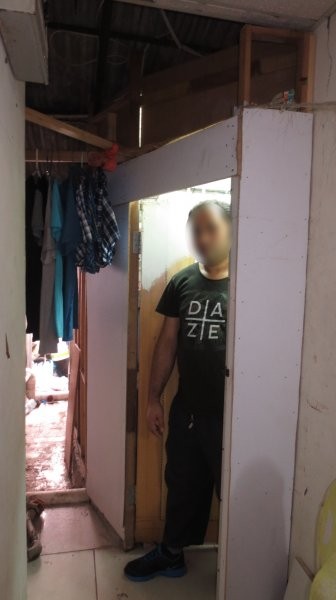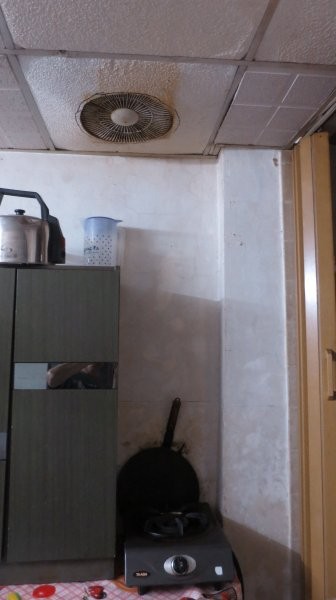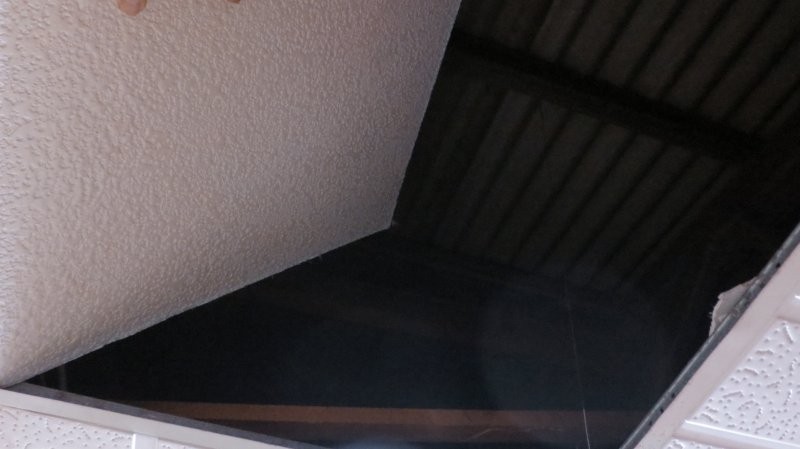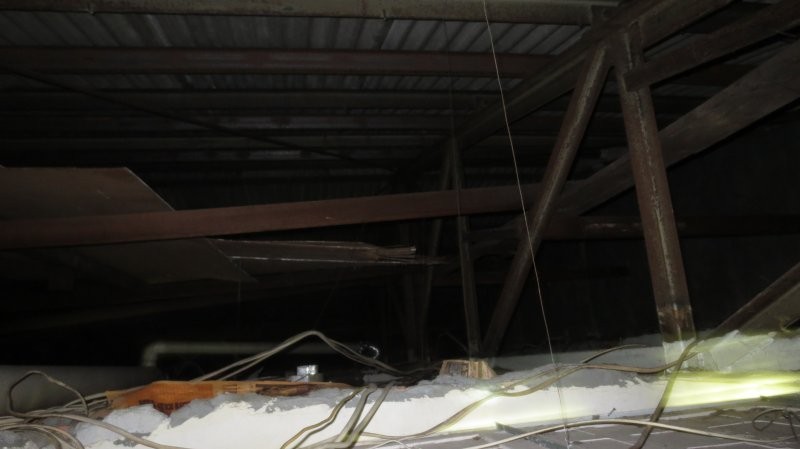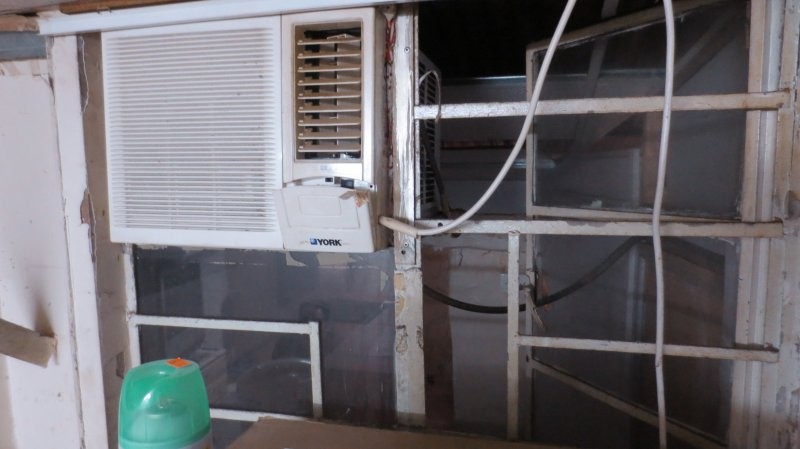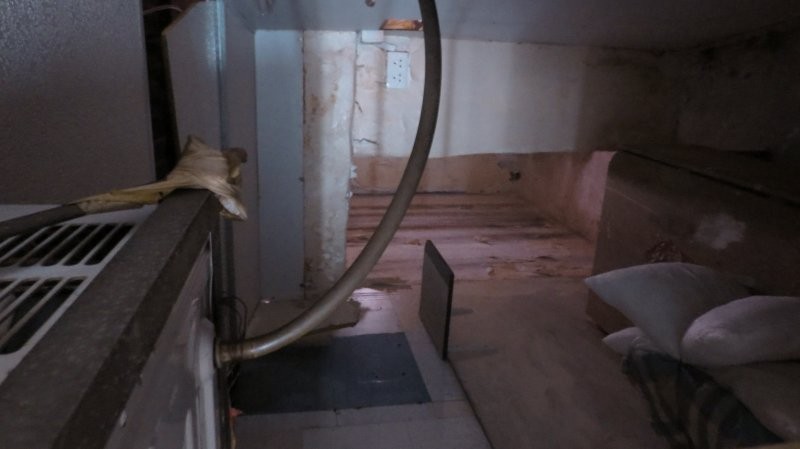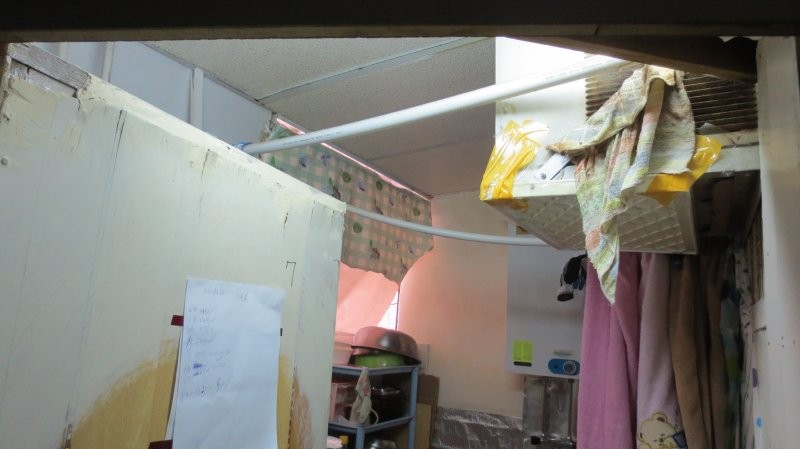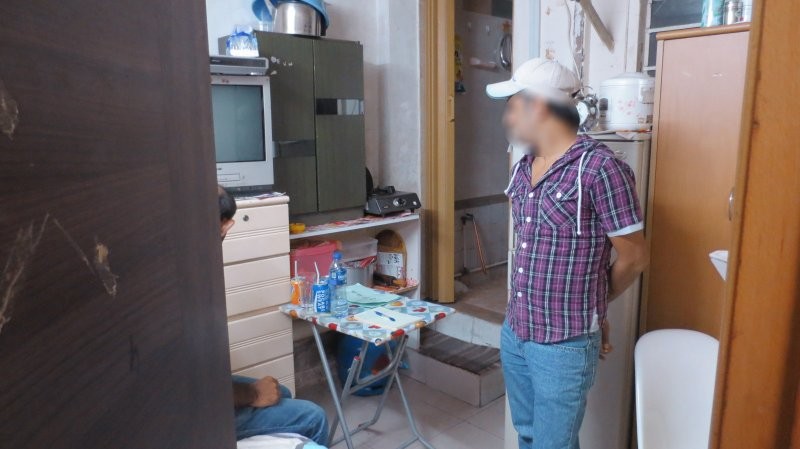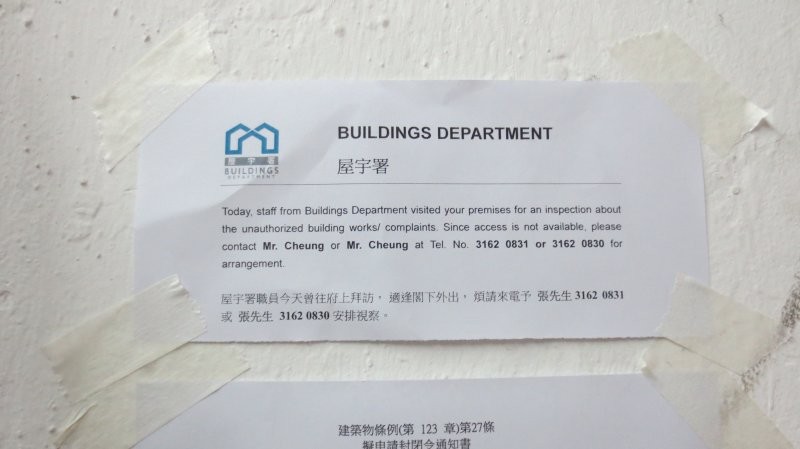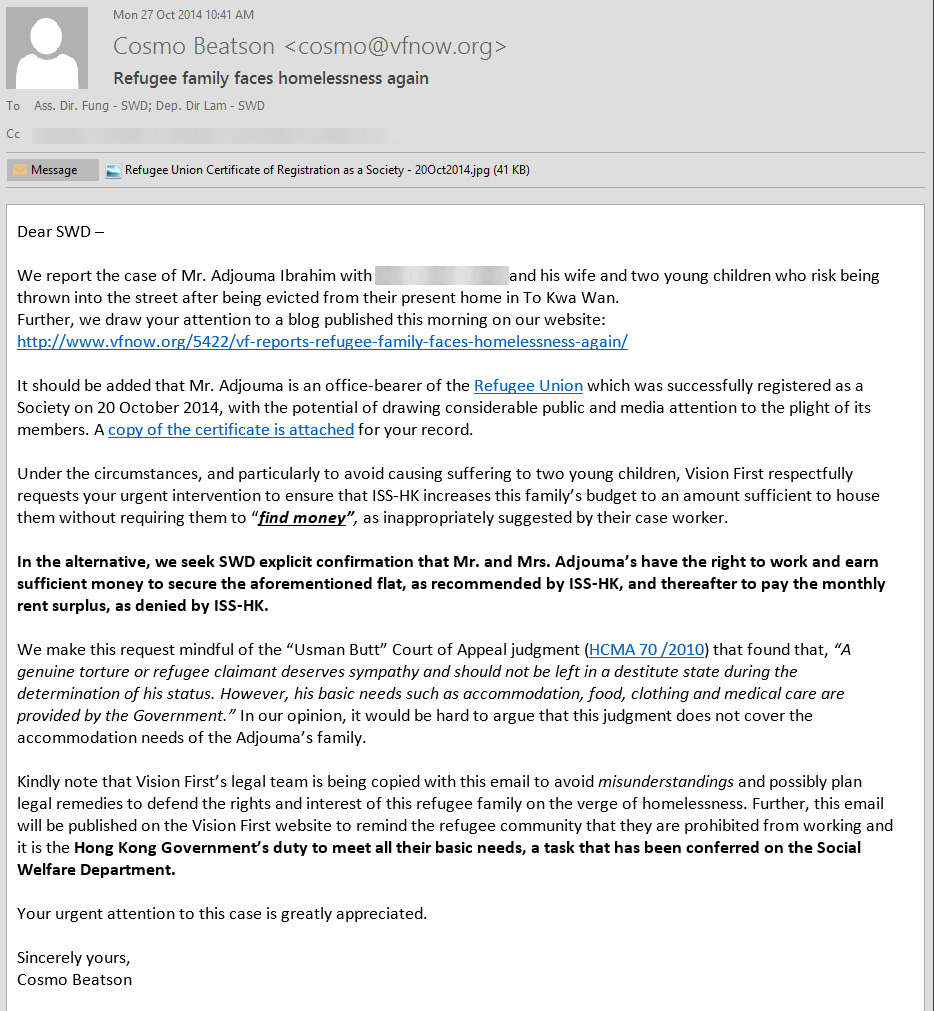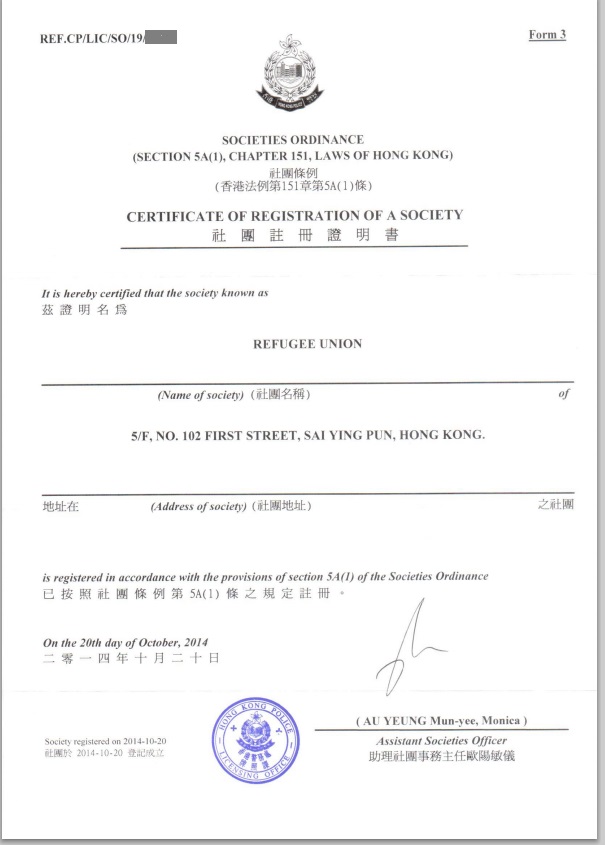No. 68 – The Slum With New Walls
Nov 26th, 2014 | Advocacy | Comment
On 18 November 2014, Vision First gained access to another secluded refugee slum for the first time. We had explored this area before, but were not aware that refugees lived inside this rusty compound hidden by a high metal gate and wall. It was hard to distinguish this slum from a scrapyard until a collaborative refugee led us inside.
Isolated locations such as this one are ideal to conceal questionable practices such as the housing of refugees within the 1500$ rent budget that cannot be achieved in the open market. Over a half-hour walk from the closest Light Rail Train, a dozen refugees have been settled here for years with the support and approval of ISS-HK case workers
Inside there are two areas: a rickety two-storey metal structure (rooms on the ground floor) and an outside extension where metal shacks were recently converted into windowless concrete cubes with tin roofs baking in the sun. The owner might be following guidelines for more solid construction though these structures seem suspiciously illegal to an untrained eye.
The facilities can hardly be called such: sinks hangs precariously from rusty metal sheets; shower spaces are concrete floors with iron sheets with water (cold only) scooped from plastic bins; cooking is done outside against brick walls or side tables; a shared toilet is mounted in a corner without flushing water.
This appalling assemble of improper housing structures (and suspicious electrical wiring) is home to about ten refugees who are prohibited from working to supplement their 1500$ rent assistance. Such constraints leave vulnerable refugees at the mercy of unscrupulous landlords who seem to enjoy the support of ISS-HK to ensure there are no vacancies in refugee slums in rural Hong Kong.
No. 67 – The slum with broken windows
Nov 20th, 2014 | Advocacy | Comment
Eighteen months ago, on 19 May 2013, Vision First exposed the deplorable (and in our view illegal) living conditions of refugees residing in alleged illegal structures supported and subvented by ISS-HK with rent assistance paid to purported landlords from the government purse.
One and a half year later, little has ostensibly changed, except for Vision First being sued for defamation by ISS-HK. Despite overwhelming evidence presented to local and international media, including CNN exposing “Hong Kong’s shameful treatment of refugees”, civil society remains embarrassingly silent about the government abuse of vulnerable refugees.
A code of silence apparently paralyzes social workers, refugee workers and legal practitioners who work daily with the refugee community. These professionals are presumably concerned with human rights, protection and justice, however, to our knowledge, nobody visits the slums or reports on the cruel, inhuman and degrading treatment of refugees living in abject destitution. Why?
In the second half of 2014, Vision First exposed sixty-six (66) refugee slums where protection claimants are housed in blatant disregard of numerous laws relating to building structures, rental properties, health and hygiene, fire safety and others. It is perplexing that not a single government department stepped forward to address related problems. Why?
In this bleak environment Vision First is undaunted in its mission to counter refugee slums in Hong Kong and the deplorable treatment of hundreds of men, women and children forced into unacceptable living conditions. A handful of the worse slums were closed down when ISS-HK stopped renewing (questionable) tenancy agreements, though business is thriving in others.
This marked an apparent shift in policy. Prior to the slums being exposed, there seemed to be little concern for proof of ownership. Currently ISS-HK case workers only approve alleged illegal structures where landlords prove ownership of the land. Vision First takes credit for this small, but meaningful success that could be interpreted as an indirect admission of responsibility.
“I lived in this metal hut for three years” said a Bangladeshi refugee, “My case worker [from ISS-HK] took photos to show the bed and the fridge and the fabric covering the metal sheets. She didn’t want to see what was behind.” Such superficial and arguably misleading documentation might submit to the Social Welfare Department contracts and photos supporting adequate housing.
SWD officials are invited to join Vision First in a field inspection of the slums. They would learn that, for example, the new compound illustrated below (“Slum Number 67”) is comprised of metal huts with broken window frames and broken windows that cannot be closed because missing handles. Cooking and washing facilities are appalling and the toilet is several minutes’ walk from the hut. The grim reality its tenant endures is not reflected by the tenancy agreement and a photo of his bed.
Refugee families rally to show discontent
Nov 17th, 2014 | Advocacy | Comment
A splendid sunny afternoon was the bright backdrop for a group photo of refugee children, many born in the city with no prospect of local integration. A Bangladeshi father of two was first to arrive, “I sought asylum in September 2004 and ten years later we are counting every dollar in our pockets. We raise two children but cannot work. Every month we sell 500$ of [emergency rations] to pay for extra school [expenses]. We are like beggars because nobody will give us work.”
When everything else is lost, refugee parents give up personal dreams and aspirations, but will obviously not forsake their children who deserve every chance to prepare for the future, as challenging as that may be. An African father of three explained, “We only have hope. If there is only a tiny pinprick of light we must walk towards it. If it is [extinguished] there is only blackness, despair and nothing to live for. We can never go back because we came here to save our children.”
“Their grades are good even in Chinese,” says a proud South Asian mother, “But they miss two days of school because I don’t have bus money. I think they have the right to have a future because the parents they suffered to save their life. Why should they be punished for the problems that their parents [escaped]? I hope this action will make public to the suffering caused by not [being allowed to] work. Can a family live without work?”
The joyful exuberance exhibited by children at play was in sharp contrasted to the parents’ worries. They speak to Vision First and a news reporter in hushed voices seemingly not intended for the young ones to hear. Such prudence might evince a hopeful attitude maintained at home to tirelessly encourage children to bravely face a grim and disheartening reality.
Frustration runs deep and not a single parent genuinely shares the light-heartedness demonstrated by their children at this gathering. Years of delays and disappointed eroded trust in the system almost entirely. Holding a beaming daughter, a West African father explains, “Why does the government punish us and make life impossible? We must [focus] attention on the injustice of denying refugees [the right to] work, but making us pay thousands of dollars [in basic living costs] every month. Why are we jailed for working if we don’t get enough [government assistance]?
A South Asian mother joined in with a hopeful message for the authorities, “I wish and pray that the people responsible for our needs, especially for the kids’, will see and feel our struggles. At least they can open their eyes and remember that the young ones are our future.”
The struggling mother of three gorgeous girls added, “The mothers and fathers of these children are not allowed to work. I wish and hope that Social Welfare Department and Hong Kong government will help these children to have a better future. I hope someday these children will achieve their goal in their lives to prove that, even if they are children of refugee, they can have a good future. [They can] show the world that refugee children have the right to achieve their goal in this world.”
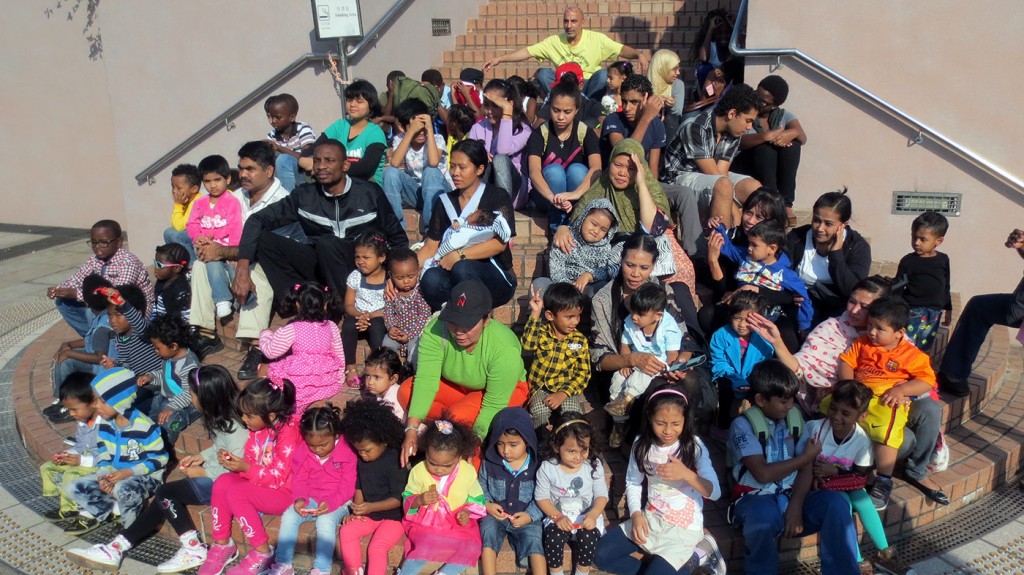
Children caught in the middle
Nov 14th, 2014 | Advocacy | Comment
Difficulties start for refugee children before they are born and compound sharply during the rest of their stay in Hong Kong with no end in sight. Information about their age groups is not publicly available, so there is no official data on the number of refugee children and newborns. There are about 300 minors among Vision First’s 1600 current members, approximately 18%.
Vision First reports the following: as a direct consequence of stringent asylum and border policies, many children suffer early parental separation when relationships break down and one parent is left to care for the child, typically the mother. Single-parent children seem to outnumber those born to married refugee couples. Both groups face a specific set of hardships and the first challenge is obtaining a birth certificate from the Registrar of Births and Deaths.
1. Parents of newborns are asked an apparently innocent question: “What is the nationality of your baby?” This question however hides innumerable problems. Let’s say for instance the parents fled Mozambique. The child is technically stateless as the embassy would not have been notified for protection reasons. However, parents are pressed for a specific answer, or else birth certificates cannot be issued. The correct answer should be “stateless” and Hong Kong is a signatory to the UN Convention Relating to the Status of Stateless Person.
2. The housing, food, clothing and medical troubles faced by refugee children are largely the same as those encountered by adults, although there is a shortage of milk formula and an absence of diapers for babies. As welfare assistance is provided within a system that seems to encourage voluntary departures, it is here that refugees are caught in the middle and punished for being born in an undesirable family. It is debatable whether the authorities have taken children’s needs duly into account when formulating assistance policies across the board.
3. Problems grow exponentially after children enter the schooling age, which generally start at 3 years old, when most resident children attend kindergarten. It warrants repeating that refugees are not allowed to work and should therefore receive full cost wavers from the authorities that do not normally deny the right of children to attend school. What happens at hospitals should also happen at schools, with refugee parents necessarily exempt from all payments.
Following our advocacy work, we are glad that the authorities began waving kindergarten school fees starting from August 2014. Nevertheless scores of children are denied essential early education because some refugee parents are unable to prepay school fees from August to December prior to subsidy payments. Further, kindergarten uniforms, books, bags, transportation and meals are additional costs not covered by fee remissions. Such onerous burdens force desperate parents to scramble for cash, which might include working illegally, thereby risking arrest and imprisonment.
Financial difficulties at primary and secondary schools are lessened by full fee remission, allowances for books and internet and partial transportation refunds. However, piecemeal policies expect destitute parents to pick up the bill for many essentials, such as uniforms (about 2000$ each for winter and summer), shoes, school bags, meals, actual transport fees (including accompanying parents for younger kids), stationary as well as countless miscellaneous fees.
The cost of these shortcomings is expensive in human terms. Not only is there the grave issue of the criminalization of working refugees, but there is also the widespread vilification and humiliation of inadequately supported families. For instance, children are teased for having used books (something they get over), but they fall sick wearing summer uniforms during winter months. Refugee children eat bread and jam, not lunchboxes (something they overcome), but might skip two or three days of school a week for lack of bus money. Cutting government support short causes countless deleterious effects generally unnoticed and unreported.
It is hard to witness parents wipe tears of shame recounting how they feel they let their children down. There is little comfort parents can give children who return home to ask, “The kids teased me because I don’t have winter uniform and didn’t have lunchbox. What should I tell them, mummy?” as we were recently told. If the government is serious about stringently banning refugee work, it should at least be consistent in deploying policies that fully support refugee children’s compulsory education. Otherwise, refugees should be allowed to work for the time they need to pay school costs.
It is hard to understand contradicting government policies that punish refugee children through their most vulnerable years. In the long run few benefits will accrue and no savings will be made by authorities who will eventually have to deal with scores of stateless children that could have been treated with a little more foresight and a lot more respect.
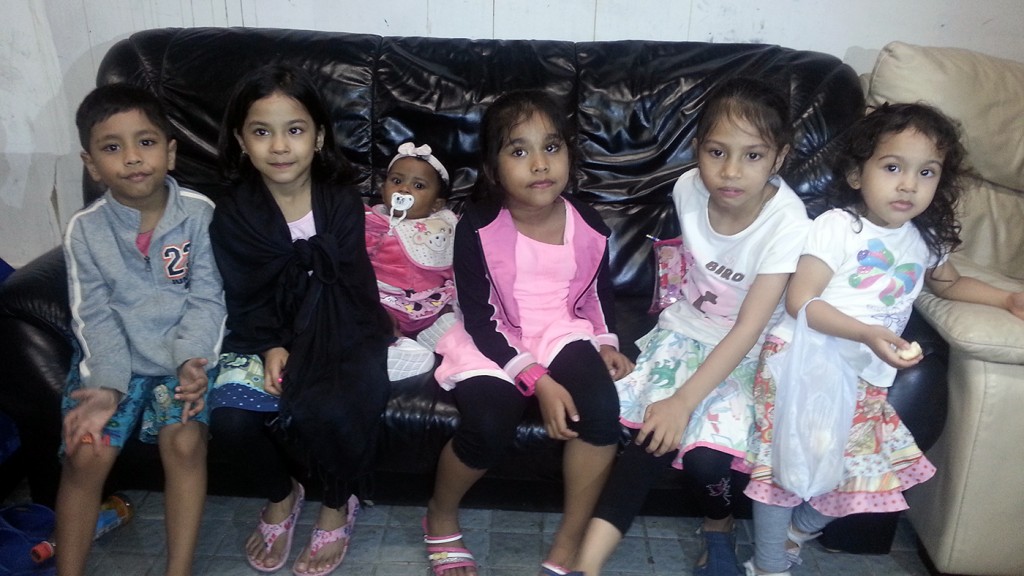
Under a metal sheet roof in Kowloon City
Nov 10th, 2014 | Advocacy | Comment
Unfair and unrealistic asylum policies force refugees to contend with unscrupulous landlords for living space that is confined, overpriced and often illegal. While the last word hasn’t been said on the 66 refugee slums exposed by Vision First in 2013, numerous refugees accept dangerous and substandard accommodation only partly subsidized by the official 1500$ rent assistance.
Five refugees rent partitioned rooms in a derelict structure erected on the rooftop of a decrepit building in Kowloon City recently targeted by the Building Department for “unauthorized building works”. One South Asian refugee lived here three years. Vision First queries how ISS-HK case workers approved these rooms in the absence of “Evidence of ownership” (according to ISS-HK rental guidelines) that presumably relevant departments would not issue for illegal structures.
Basic, legal rooms cost about 2400$ in urban areas and greedy landlords squeeze refugees for all they are worth. “We don’t have any choice.” said Marcus from West Africa who lived here for two years, “If we don’t pay the difference, the landlady shouts ‘(Expletive) you pay or you go out!’ And if one of us comes short, her husband cuts electricity to all seven rooms until everyone pays. She wanted 3000$ for my room, but I told her 2000$ is the maximum I can afford. There is a shortage of cheap rooms. What can we do?”
Saeed from Pakistan stayed in a guesthouse for six weeks after Vision First reported he was homeless. In May 2014 he moved into this structure under a metal sheet roof. In August his electricity bill shot up to 1,340$ because his air-conditioner is mounted between two rooms and recycles overheated air with no external vent. Saeed installed a fan in the false ceiling to remove cooking fumes, blowing more heat above, not outside. He pays dearly for a room he thought he rented for a bargain 2000$. Then there are the rats “running over the ceiling like having fights”.
Number 7 is a coffin-room shocks the conscience of any visitor. At the edge of the rooftop, plywood separates a cooking-washing-toilet space that defies descriptions (see photos below). A gaping space above the wall with no window is only covered by a plastic sheet. The air-con unit from room 6 vents into this space. A mattress is thrown on the floor in a crawl-in area without a proper ceiling, where plastic bags hang to catch dripping rain. Here is a room that rents for 1500$ and supports ISS-HK claim that some refugees actually live within the budget!
It’s hard to believe that Mahmood has stayed here two years. He explains, “I cannot work so how can I rent more? I have no money to pay more rent so I cannot leave this place. There is no window to stop the rain. This is fake room. Nobody want to live here, but I have no choice. Summer is too hot. I go park. I go walking around at night until it is cool, because too hot under the metal roof.”
It is questionable that this unauthorized structure was approved as accommodation for five refugees with rent from government funds. These partitioned rooms are constructed to give an appearance of suitability from the entrance, though, upon closer inspection, the walls and ceiling tiles conceal a deceptive reality. It could be argued that some Chinese residents also live on rooftops, though stronger construction and maintenance is not overlooked for their dwellings.
Inspection of the ISS-HK agreements raised further concerned about the addresses: one contract showed the 5/F, another showed the 6/F; the street number changed from 25 to 27, although the latter is correct. If case workers fail to examine ownership documents with due diligence, purported landlord may complete tenancy agreement with incorrect information that places refugees in other buildings and on different floors, when only separated by plywood walls.
Vision First objects to unrealistic asylum policies that force refugees to accept dangerous and substandard housing, often paying extortionary rentals, with little or no support from case workers who should manage landlord relations. These five refugees living under a metal sheet roof are a case in point. They live in a condemned structure and pay excessive rent under threat of eviction. Their rooms are shoddy illegal structures, with unlicensed electrical work, overheating air-conditioners, poor sewage and either no ventilation, or no windows at all!
The overall picture is bleak for the refugee community. 9000 refugees are denied adequate rent assistance by failed welfare policies and prohibited from working which would enable them to rent basic, safe housing. Immiserated by these two contradicting restrictions, they are exploited, criminalized, vilified and presented as a burden instead of being allowed to work until their asylum claims are determined.
Advocacy speaks truth to power
Nov 4th, 2014 | Advocacy | Comment
The Occupy Central movement has established civil disobedience as a method for dissatisfied citizens to voice grievances against governors who are perceived as not paying attention to their needs and aspirations. No matter how the endgame will develop, the pro-democracy demonstration has already contributed to reshaping the city’s political and social landscape.
Although the citizens’ contemporary struggle is different from the one refugees undertook this year against welfare oppression, common denominators may be found in both parties calling for the re-evaluation of basic assumptions about the purpose of advocacy, the reach of activism and the function of critical dissent. In this respect, the genie is out of the bottle.
Protesting citizens have political and economic aspirations. Refugees yearn for protection and employment. Yet both parties exhibit a fundamental aspiration for dignity and inclusion blindly denied by the establishment. Critically, both struggles unite under the umbrella of resistance of the disenfranchised against extreme capitalism and the self-serving alliance of business and politics that exploits the subjugated masses. Empowered individuals seek an end to their humiliation.
Vision First is rooted in robust advocacy and activism for refugee rights, but our modest success is ascribed exclusively to those refugees who spearheaded change. Like young citizens who choose to be bothered, we should celebrate those refugees who dared to speak out courageously against abuse and immiseration. They rise to shape their destiny against insurmountable odds.
A new era seems to have dawned. Refugee advocacy and activism have become almost mainstream. We notice this through civil society campaigns and particularly through frequent interview request from university students. “Vision has gained high reputation among refugees and those people who are enthusiastic about public welfare undertakings … I feel bad when I see so many refugees suffering in Hong Kong …” wrote to us a student.
Against this background, Vision First has encouraged for years refugees to step out from the shadows and demand the protection they are promised. To strengthen this effort, we withdrew from service provision and reinforced advocacy, because civil society must give voice to the critical conscience that condemns the inadequacy and moral bankruptcy of asylum policies. Given the voluntary nature of our engagement, whereby results are contingent on capacity, we take pride in tireless empowering refugees to become agents of change.
Today, finally, many in the refugee community are awakening to the cold realization that prolonged hardship and unavoidable deportation might not (and certainly should not) be accepted with submissive inaction. They appreciate the urgent need for deep and concerted advocacy and activism against those who wield power and fall short of legally binding obligations.
Vision First vigorously encourage refugees to speak out against abuse, articulate legitimate grievances and demand improvements to the asylum sphere. Ultimately, we go by the conviction that motivated many leaders who made history and are celebrated as heroes in this world – a concept that even refugees have often reported to us with these words: “It is better to die standing than live life on one’s knees!”
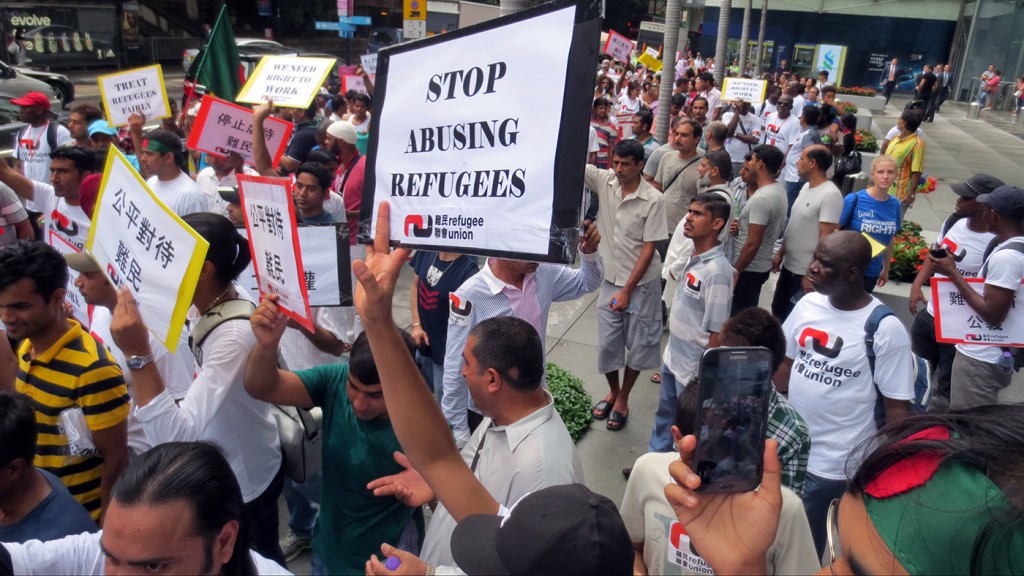
VF Reports – Refugee family faces homelessness again
Oct 27th, 2014 | Advocacy, Housing, VF Report | Comment
Vision First reports that 15 months after losing their home, a refugee family from Togo risks being homeless again with two young children. On 16 July 2013 we reported this family’s predicament when a rental increase for a rundown flat in Cheung Sha Wan put the family on the streets. ISS-HK had refused to pay a 900$ rent increase and an inexpensive 4500$ flat was lost.
Ibrahim explained that he had gone to the ISS-HK office and suggested to sleep there, if he was not booked into a guesthouse, or provided with an alternative arrangement. Instead, Ibrahim says he was removed by the police that were called to deal with a welfare issue. A less than humanitarian confrontation ensued and was reported by AM730 daily, exposing the grim reality of refugees crushed between insufficient welfare and draconian jail sentences for working.
A few days later the family was accommodated in a guesthouse where they resided for over a month. This arrangement may have cost tax-payers at least 12,000$ that we think could have been saved if 900$ had been confirmed for the original home. That wasn’t the end of it: from September 2013 till October 2014, the family was housed in a To Kwa Wan flat estimated to cost 2000$ more than the 4500$ flat they had been evicted from.
How much public money was wasted between July 2013 and October 2014?
Fast forward one year and the family faces the same predicament. On 22 October 2014 Ibrahim was notified by ISS-HK (without a letterhead) that his family would be evicted on 30 October 2014. Further, Ibrahim reported that electrical power to the flat was cut the previous week allegedly to force his eviction. He complained to the SWD Head-office and an urgent intervention by SWD staff compelled ISS-HK to supply battery-powered lamps to prevent the family from living in the dark. Now Ibrahim is worried that the water supply will be cut, as that would be unbearable for his wife and children.
Ibrahim says that he was urged to find a flat for 6000$ a month, but the family was frustrated by sky-rocketing rents and a lack of bus money to go flat-hunting around Kowloon. Ibrahim had previously reminded his ISS-HK case worker, “I don’t mind if the new place cost 1000$ or 6000$. If it is suitable for my family I will take it. But don’t tell me to pay extra money, because I don’t have money and I am not allowed to work.”
Ibrahim was hopeful when last week ISS-HK asked him to inspect another flat in To Kwa Wan that he saw and found suitable. The place was good, but there was a problem. Ibrahim was told by ISS-HK that he should find 4000$ to close the deal, as the rent is 7000$ and his rent allowance 6000$. In practice, Ibrahim requires 2000$ to top up two months deposit, 1000$ for the first month rent and 1000$ for the utility deposits. Ibrahim was stunned by what he was told, knowing that he cannot obtain any money unless he gets a job.
Vision First respectfully asks SWD to confirm that Ibrahim and his wife are authorized to work for the time they require to raise $4000 and thereafter to raise $1000 to pay the rent surplus that ISS-HK seem unwilling to provide to pay the family’s monthly rent in full.
Ibrahim commented to Vision First, “ISS gave me a budget of 6000$, but then sent me to see a 7000$ flat and expects me to find 4000$ cash! What are they thinking? My case worker told me to call NGOs and find the money. I am not a beggar and she is paid to house me. She knows I have no money and cannot work. It is shameful that ISS give refugees low budgets and then expect them to sign contracts and struggle every month to find extra money for rent!”
For nine years Ibrahim endured the inhospitable conditions of seeking asylum in Hong Kong. He has learned to speak up for himself and hold his ground as a protection claimant who, it should be noted, hasn’t been screened by Immigration Department since he arrived in October 2005.
Ibrahim assures, “This time I will go to the media myself and bring this matter to the public’s attention. I will not become homeless again without a struggle. I will refuse to move into a guesthouse where my children suffered too much last year. There was no space to move in the small room and we ate instant noodles and biscuits for a month, because we were not allowed to cook.”
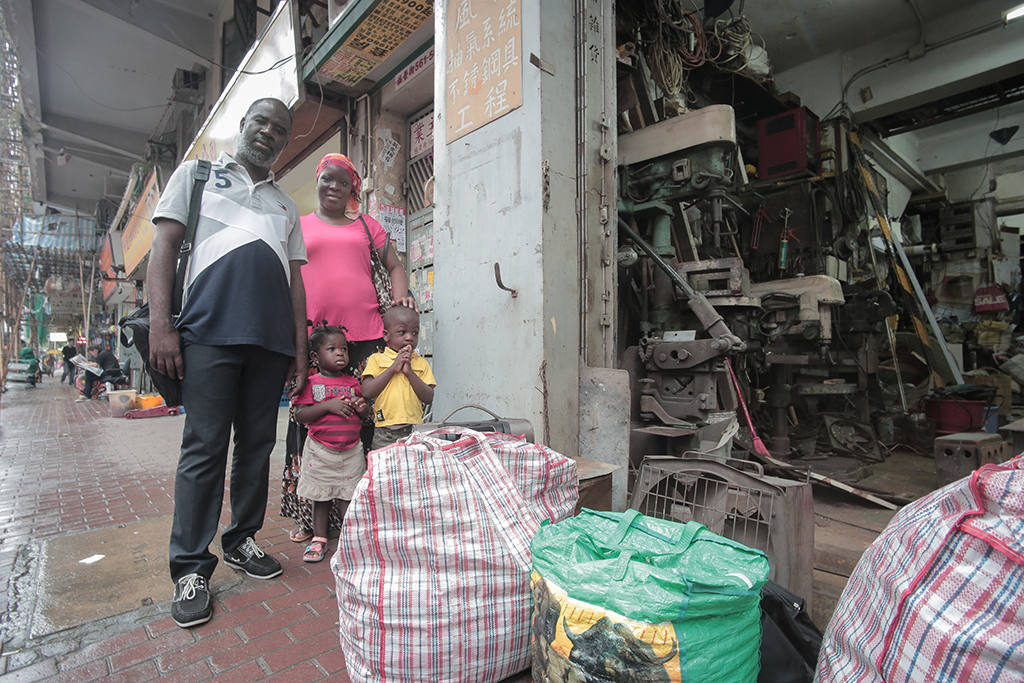
Who profits from the Revolving Door Scam?
Oct 24th, 2014 | Advocacy | Comment
The refugee community was recently buzzing on social media over a Facebook page that draws the spotlight of public scrutiny on the darker side of the trade in emergency food rations for cash. It is indeed widely known that refugees sell all or part of their rations for cash to buy culturally appropriate groceries and meet pressing financial needs disregarded by government assistance. It is also known that some may steal for the same reason.
However, it is unlikely that the individual in the Facebook page is aware of his alleged exploits going viral on social media. It is further unlikely that he boasted about it in the first place. The posts expose a reality that exists, although its contours are not always well defined. Interestingly, it reveals very convincingly the capacity of refugees to seize out of necessity the few opportunities that arise from a questionable welfare system. It might be illegal, yes. But no one seems to care.
Indeed this Facebook page might be the work of a person whose business was in decline and attributes his or her failure to an individual who might or might not be involved. A message dated 9 October 2014 claims, “I am proudly announce that i am one the Top Refugee who supply to all Major Provision store in hong kong, my customers are [list deleted] And Many more and also Thousand of customers who buy from Meat, Rice, Oil, Grocery, if anyone looking to buy cheap Refugee food, please contact with me”.
Legally speaking, refugees may eat, dump or trade food rations and do not break the law by reselling them, although the practice is understandably discouraged. In reality, we observe that, while such activities have been going on for years, nothing is done to address the underlying causes that sustain them. The trade appears to be condoned, or at least accepted, as a way for refugees to raise desperately needed cash. It was an open secret even before these images circulated.
Vision First calls this operation the “Revolving Door Scam” (first reported here on 3 April 2014) in reference to the re-circulation of food rations that are traded at half of market value until somebody takes them home to eat. The scam is encouraged by substandard quality, because the least attractive or edible groceries are, the more likely it is that refugees will sell them. The government sponsors of this operation should calculate the waste generated by a scam predicated on fundamentally flawed assumptions about what refugees need and what they eat.
Readers may draw their own conclusion on the masterminds behind the Revolving Door Scam that Vision First estimates to channel about 16 million HKD yearly into the pockets of cash-strapped refugees. In a convoluted fashion it has effectively become the ‘Cash-for-Food Program’ resisted by the government ostensibly to prevent refugees from indulging in vices. A refugee astutely suggested that since money is prioritized to activate mobile phones (an Immigration requirement to be released from detention), the scam ensures 24-hour traceability by authorities without the expense of an ankle-monitor program.
Finally, the broader impact of the scam on neighbourhood economics should not be overlooked as discounted rations cause the prices of foodstuffs such as rice, flour, sugar, ghee and oil to plummet to one-third of retail value. Not only are grocery shops, restaurants and canteens purchasing these cheap supplies, but it is reported that low-income families have become avid consumers for the savings achieved. Alarmingly, such end-user demand is growing and encouraging the trade.
Considering that thousands of these commodities are traded daily at heavily reduced prices, it is unsurprising that troubling ripples are causing unexpected consequences. It would be interesting to investigate not only who benefits from the Revolving Door Scam, but also why so many people appear willing to turn a blind eye despite it having been an open secret for many years.
Whose wheels are greased by this scam and why is it tolerated?
